Posts Tagged ‘freedom of expression’
PEN Journey 36: Bled: The Tower of Babel—Part One
PEN International celebrates its Centenary in 2021. I’ve been active in PEN for more than 30 years in various positions and now as an International Vice President Emeritus. With memories stirring and file drawers of documents and correspondence bulging, I am a bit of a walking archive and have been asked by PEN International to write down memories. I hope this personal PEN journey will be of interest.
In pulling out papers from 2005 of PEN conferences and the 71st World Congress, I came across two documents that told a very human story in PEN and a coincidence of life that I share here:
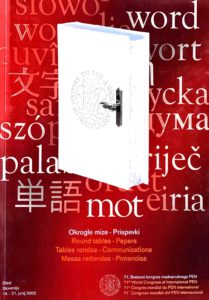
71st PEN World Congress 2005, Bled, Slovenia, Round Table Papers
The first paper I skimmed was a talk I’d given as PEN International Secretary at the Translation and Linguistic Rights Committee Conference in Ohrid, Macedonia in September 2005; the paper included the testimony of a PEN member at the end. The second text I read was from the Round Table Papers of the PEN Congress a few months before, in June 2005. This paper was on the Congress theme Tower of Babel: Blessing or a Curse? The paper was the first in that publication and was written by celebrated Nigerian poet Niyi Osundare who speculated on what the world would be should there be just one language and then meditated on what in fact the world was. Shared below are excerpts from Dr. Osundare’s paper, “The Blight and Blessing of Babel:”
“A one-language world would be too simple, too linguistically neat, too unrealistic. And, I daresay, too unnatural. For everywhere in nature there is a tendency towards fission and mutation on an intra-and inter-generic basis. Variety is not only the sauce of life; it is also its source…
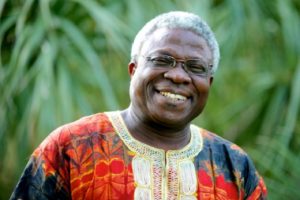
Nigerian poet Dr. Niyi Osundare
“Yoruba culture (the culture in which I was born and raised, and one that I know best) understands the necessity of diversity and inevitability of varieties in different aspects of human life. Hence the saying “Mee l’Oluwa wi” (Many, says the Lord) and “Ona kan o w’oja” (There are countless routes to the same market), both of them short, handy variations on a longer proverb “Oju orun t/egberun eye fo lai farakanra (The sky is wide enough for a thousand birds to fly without colliding). Corroborating this pluralist perspective is the folktale about the Tortoise, ever cunning and self-centered, who one day decided to capture all the wisdom in the world and seal it up in one pot for his own use in an effort to become the wisest being in the world. Of course, his project ended up in a laughable disaster as his pot fell to the ground and exploded while different fragments of the imprisoned wisdom dispersed in different directions, free for all, unmonopolisable. In an essentially pluralist Yoruba worldview, phenomena exist by mutual definition; a thing, a person loses its sense of proportion when there is nothing else to compare it with. The trajectory of life hardly ever follows one straight and narrow path; it must confront the crossroads, experience the thrills and tortures of decision and indecision, before arriving at the juncture of choice. And for the act of choosing to take place, there must be more than one…
“Literature (and the arts generally) is, no doubt, a powerful weapon in the struggle against the blight of Babel. By endowing our airy thought with that ‘little habitation’ and ‘name’ (hail Shakespeare, one of the supreme healers of the wounds of Babel), by generating universal sympathies, globalizing the particular and particularizing the global, by producing that music of the spheres whose winds stir the eaves in different lands, by evoking images which touch hearts across cultures, by articulating those humane values that are essential to human freedom everywhere in the world, by constantly lifting the human spirit and enriching, interrogating human reality with the supple possibilities of fiction…literature strives to restore some of the lost potentialities of Babel. For every significant writer is a bridge-builder of a kind, a witness, a participant-observer, an advocate of a truly humane future.
“No doubt, the phenomenon of Babel has left its fragmentations and dispersals. But it has also bequeathed to humanity a panoply of sounds and letters, an astounding (even if confounding) array of tongues which challenges the tyranny of uniformity and monotony of methods. It has necessitated the building of bridges across diverse tongues and cultures, these bridges being, in a way, a horizontal alternative and antidote to the vertical impossibility of the Tower itself.”
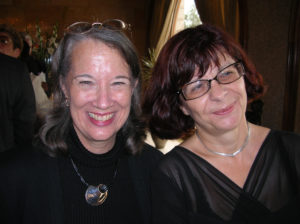
L to R: Joanne Leedom-Ackerman (PEN International Secretary) and Kata Kulavkova (Chair PEN Translation and Linguistic Rights Committee)
Dr. Niyi Osundare, a Nigerian PEN member, had moved to New Orleans for specialized education for one of his daughters and was also a member of the African Writers Abroad PEN Center. Recounted here is my talk to the Translation and Linguistic Rights Committee a few months after the Bled Congress, in September 2005. Only as I recently read the end of my paper did I grasp the connections and the range of PEN’s reach and work. My observations at the time:
The theme of the 8th Ohrid P.E.N. Conference—Writer Within and Without a Homeland—struck a particularly sonorous chord as I was preparing to come here.
In the U.S. the question of homeland has been on the national consciousness for the past month as one of America’s most diverse and multi-lingual cities—New Orleans—has literally disappeared. Its population evacuated as the city sank into the waters of the Gulf of Mexico. A large portion of the Gulf coast also fled in the face of Hurricane Katrina. Over a million people dispersed throughout the land in one of the largest displacements in the nation’s history. Many will never return to their homes.
In Europe and Africa, Asia and Latin America even larger displacements have occurred in the last century, often because of war, famine, politics, and also weather. All of us remember the disappearance of towns and villages and whole sections of coasts in the countries hit by the tsunami last December.
When a home is suddenly gone, family scattered, livelihood and career and ambitions all uprooted, one is forced to consider what endures, and what one can take with him. Home moves from a physical place to a place in consciousness.
The ability to speak with others and to tell the story is especially important and makes the idea of language as homeland compelling, also imagination as homeland, literature and art as homeland, and particularly relevant to PEN, a community of fellowship as homeland.
I’d like to read a message to PEN’s Africa Writers Abroad Centre from a Nigerian writer trapped in New Orleans:
This is my first real internet access since the disaster struck…I can’t thank you enough for your concern and care. It’s been all so overwhelming. My wife and I are alive and, after passing through five horrendous “evacuation centers”, have been allocated to the Red Cross shelter in Birmingham, Alabama. The nightmare of the past seven days is simply unimaginable. We very narrowly escaped drowning in our own house. Pursued by an 8-foot high toxic flood water (15 feet in the street outside our door), we were forced up a stuffy, airless attic, where we were holed up for 26 hours, with no food, no water, no prospect of any rescue. We were only saved by the fortuitous intervention of a neighbor who heard our shout for help when he came round with his rescue boat to pick up something from his own house. With life vests provided by him, we managed to swim out of our house, leaving everything we had behind. Right now, all our clothes, books, academic and professional credentials, travel documents, computers, manuscripts, etc are submerged in the dirty waters of the New Orleans flood. Hell has no other name… We deeply appreciate your concern. Kindly pass on our gratitude to all on your list serve.
Yours in the Eye of the Storm
[Niyi Osundare]
I’m told he has been overwhelmed by the outpouring of concern. While the concern and offers of assistance can’t replace what was lost, it can fill in some of the spaces in the heart.
In the U.S. those displaced are at least relocated in the same country and for the most part speak the same language, though the difference in accents has its challenges. What has been heartening has not been the help of government agencies, but the outpouring of citizens in communities all over the nation and abroad. One would wish this empathy would prevail and continue.
The ability to imagine and to reach out to another and try to see from the other’s point of view is one of the elements of great literature and also of great people. This empathy is a value around which PEN has developed and one which PEN at its best embodies.
A community spread across 99 countries, shaped by different nationalities, cultures, races, religions, and languages, PEN is a fellowship of writers who appreciate the importance of telling a story and defend the writer’s freedom to tell it as he sees it and to tell it in the language of his choosing. Language is the writer’s tool, expressing the music of his thoughts and sounding the chords of his imagination.
Language, imagination and fellowship—all are a kind of homeland that can survive the elements and can even survive politics and war, a homeland, one of whose addresses we like to think is at P.E.N.
Dr. Osundare and I didn’t know each other at the time though perhaps met briefly at the Bled Congress which was attended by more than 275 writers. I know many of his colleagues from Nigerian PEN and at the time from the African Writers Abroad PEN. I made the connection only as I reviewed the papers. Dr. Osundare is now a professor at the University of New Orleans.
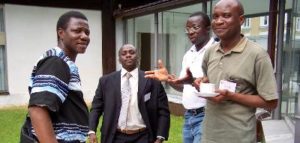
Delegates at PEN International World Congress, Bled, Slovenia, June, 2005. L to R: Remi Raj (PEN Nigeria), Dan Kayhana (PEN Uganda), Frankie Asare Donkoh (PEN Ghana), Alfred Msadala (PEN Malawi)
Next Installment: PEN Journey 37: Bled: The Tower of Babel—Part Two
PEN Journey 34: Diyarbakir and Beyond—Finding Byways for Peace
PEN International celebrates its Centenary in 2021. I’ve been active in PEN for more than 30 years in various positions and now as an International Vice President Emeritus. With memories stirring and file drawers of documents and correspondence bulging, I am a bit of a walking archive and have been asked by PEN International to write down memories. I hope this personal PEN journey will be of interest.
PEN has always been about building bridges, finding the byways of fellowship among writers whose currency is language and imagination and whose hope is that even with radically different histories and backgrounds, writers might find a way to sit down across a table from each other and share stories and listen to each other and thereby have a beneficent influence on the way they and their societies see themselves and others.
It is an idealistic goal that has been battered in PEN’s hundred year history, and yet the organization continues; the dialogues continue, and writers from over 100 countries continue to meet and talk, even from countries whose governments have not found peace in decades. There have been moments of seeing that optimism realized, at least for a time, and also seeing it smashed.
The next section of these PEN Journeys covering the years 2004 (PEN Journey 33) through 2007 (August) will focus on my years as International Secretary of PEN International. I will travel through events chronologically, the number of events increasing considerably as the role demanded. I will try to knit these together as we continually try to do as an organization.
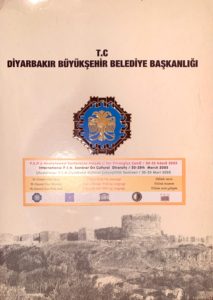
International PEN Seminar on Cultural Diversity in Diyarbakir, Turkey, March 2005
In January, 2005 we held our first board meeting of the year in Vienna where PEN President Jiří Gruša had recently taken up the position as Director of the Diplomatic Academy of Vienna which hosted us. The formal board meeting itself took place in the basement of the hotel restaurant where we were staying. Around the table in the cozy space where we sat on chairs and on a long booth was PEN’s diverse board from Algeria, Colombia, France, USA, Czech Republic, Denmark, Finland, Croatia, Australia, Norway and Japan. The search for an executive director, the new financial and employment systems going into place in the office, an upcoming meeting in Stavanger, Norway with the old Cities of Asylum Network, and an upcoming meeting in Diyarbakir, Turkey with Kurdish and Turkish PEN—all populated the agenda as did the omnipresent discussions on fundraising.
For me, the imminent departure of my Marine son from the combat zone in Iraq hovered in the corner of my mind. We were staying at a pension hotel with small rooms—single bed, dresser and nightstand; I could almost touch the walls on both sides. Outside it was snowing. I’d come to Vienna unprepared for the snow and had bought at a sale a large puffy yellow coat that now draped across the bed for warmth. At night in the dark as I fell asleep, I thought about my son and one night dreamed a desperate dream. Then the phone rang; it was 1:30 in the morning. My husband’s voice woke me. “Wheels are up!” he declared. “They are on their way home!” I still remember the moment, lying there in the dark, snow glistening in the light through the small window and feeling as though the walls had suddenly expanded and a weight lifted that I hadn’t been fully aware I was carrying. The memory…the snow, the Cathedral we passed each day in the square and at dusk in the evening, the puffy yellow coat…
I was wearing that same coat as snow fell later that month in Washington, DC the day my son finally pulled into our driveway. I was sitting on the front porch swing in the snow waiting for him, thinking about the hotel room in the dark, the restaurant basement where we helped craft a conference for writers from the hostile parties in Turkey and another to find sanctuary for writers fleeing oppression—all these memories are wrapped together in a moment of return and of the spirit lifting and life opening a corridor to walk down.
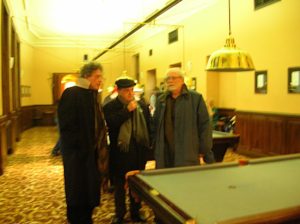
Czech PEN 80th Anniversary in Louvre Cafe where PEN members met in 1925. L to R: Playwright Tom Stoppard, PEN Int’l President Jiří Gruša, Czech PEN President Jiří Stránský.
The next meeting I attended that winter on February 15, 2005 celebrated the 80-year anniversary of Czech PEN. In Prague Jiří and I toasted the endurance of his PEN Center which had been founded by Karel Čapek and 37 Czech writers on that day in 1925. Czech PEN had survived the Second World War, the Cold War, the Soviet occupation and finally the liberation. Former prisoner, playwright and PEN member Václav Havel had become President of the country and his good friend and also prisoner Jiří Gruša was now President of International PEN. Under the auspices of the Minister of Culture, we met with Havel and playwright Tom Stoppard, himself Czech, and Jiří Stránský, President of Czech PEN at the Louvre Café where the original PEN gathering had taken place. Later, the Mayor of Prague hosted a reception with Czech PEN members in the Old Town Hall where he opened an exhibition celebrating “Eighty Years of the Czech PEN Club.”
The following week Writers in Prison Director (WIPC) Sara Whyatt and I traveled to the city of Stavanger, Norway which sat on the sea with a harbor and ships at dock. The Stavanger meeting brought together PEN and members of the now disbanded International Parliament of Writers, an organization founded after the fatwa against Salman Rushdie. The Parliament of Writers had developed a program to house writers in cities of asylum, but the Parliament of Writers no longer functioned. Many of the cities, however, still wanted to continue their hospitality for writers at risk. Stavanger itself hosted writers, including poet and novelist Chenjerai Hove, who’d been president of Zimbabwe PEN until he’d had to flee the government of Robert Mugabe. Hove was a fellow at the House of Culture in Stavanger until he passed away in 2015.
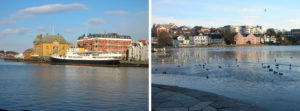
Stavanger, Norway, February, 2005 setting for birth of International Cities of Refuge Network (ICORN)
Helge Lunde, director of the Stavanger International Festival of Literature and Freedom of Speech convened PEN, representatives from the old Parliament of Writers and representatives from some of the cities that wanted to continue the program. In a several day meeting, the outlines of what would become the International Cities of Refuge Network (ICORN) were laid down with PEN as the vetting organization for applications and also a source of hospitality when writers arrived in their new temporary homes. ICORN remains active today in partnership with PEN in over 70 cities which promote and protect freedom of expression and host writers and artists at risk by providing housing, an income, literary arenas, scholarships and grants. PEN’s Writers in Prison Committee and ICORN regularly hold biennial meetings together.
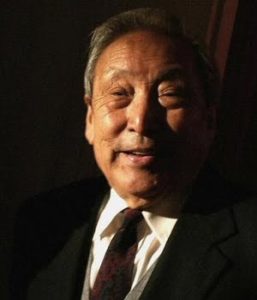
Writer Liu Binyan, a founder and first President, Independent Chinese PEN Center
The following weekend at Princeton University the relatively new Independent Chinese PEN Center (ICPC), founded in 2001, honored Liu Binyan, one of its founders and first President. ICPC’s members live both in China and abroad. The PEN Center gave them the ability to talk with each other and hold programs together, often in Hong Kong. Because of his writing and criticism of the Chinese Communist Party, especially after Tiananmen Square, Liu Binyan had not been allowed to return to China after an academic stay in the U.S. Though he never saw China again, in the U.S. he wrote and worked as Director of Princeton University’s China Initiative. (Nobel Laureate Liu Xiaobo was also a founder of ICPC and its second president.) At the dinner at the Princeton Faculty Club, ICPC members and China scholars presented Liu Binyan the book Living in Exile, written by distinguished essayists in China and abroad and dedicated to Liu who had spent considerable time in detention and in and out of labor camps. Later that year Liu Binyan passed away at his home in New Jersey.
In March “The International PEN Diyarbakir Seminar on Cultural Diversity” convened the largest and most ambitious conference that quarter in the primarily Kurdish southeast of Turkey. For years the Writers in Prison Committee had focused on cases in this dangerous region where fighting between the Kurdistan Workers Party (PKK) and the Turkish military had resulted in multiple imprisonments and killings. However, a rapprochement appeared to be expanding between the government and Kurdish citizens. In this space, PEN International had been working with Kurdish PEN and Turkish PEN to prepare this historic meeting of the two centers, along with PEN’s leadership of the Translation and Linguistic Rights Committee (TLRC). For the first time Kurdish writers and Turkish writers would speak side by side from the same stage in Kurdish and Turkish with translations of each language.
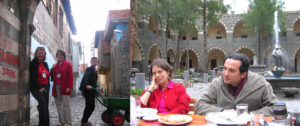
Diyarbakir, Turkey, March 2005. L to R: Joanne Leedom-Ackerman (PEN International Secretary), Jane Spender (PEN International Program Director), Carles Torner (Vice Chair Translation and Linguistic Rights Committee).
My predecessor as International Secretary Terry Carlbom had been instrumental in the planning, and we all agreed he should continue as coordinator of the seminar. Seventy delegates from a dozen countries gathered in the ancient city of Diyarbakir/Ahmed for five days. Diyarbakir dated back at least 5000 years, one of the oldest cities in the ancient land of Mesopotamia between the Tigris and Euphrates Rivers. Later it was dominated by Persia and by Alexander the Great. Because of its strategic position, Diyarbakir’s sovereignty changed many times, was part of the Roman empire, later conquered by the Arabs in 639, by Tamerlane in 1394; the Ottomans conquered in 1515. Diyarbakir continued through cycles of battles for control.
Old Diyarbakir was a standard Roman town circled by a wall, the stones of which still stood. The black basalt wall was said to be second only to the Great Wall of China. Within the walls a labyrinth of cobbled streets and alleyways unfolded, leading to towers where we could see the rivers and gardens and the city’s mosques and street life below, where caravan travelers used to stop on the silk road.
Before the conference began, PEN International Program Director Jane Spender and I explored the twisting paths and shared black tea in a central plaza with Carles Torner, vice chair of the Translation and Linguistic Rights Committee. As an American whose national history extended back barely 400 years, this accumulation of history in the streets and walls and buildings was mind-bending. In stones, in ideas…where did history reside and how did it evolve?
On the first evening Diyarbakir’s Lord Mayor Osman Baydemir greeted us at the Town Hall for a Newroz (New Year’s) reception. I thanked him on behalf of PEN for all he and the city had done to support this seminar. “It is a treat for us to visit one of the world’s oldest cities, with a history that could occupy the imagination of a community of writers like us for years to come,” I said. “Central to the Charter and ethos of PEN is a celebration of the universal which binds us as human beings and of the diversity which distinguishes each individual—the specific history, language and culture. It is our challenge and our aspiration as writers and members of PEN to provide the forums where cultures don’t clash but communicate. That is what we hope to do here in Diyarbakir.”
The first full day of the seminar we spent at the Newroz Festival. Our delegation was seated in an honored place in the bleachers which turned out to be behind the mother of Abdullah Öcalan, one of the founders and leaders of the PKK who was currently in prison. On the grounds in front of us spread thousands/ hundreds of thousands—some said a million people—celebrating the Kurdish new year, a time that coincides with the March equinox. Terry Carlbom and I were soon escorted to the main stage where we stood looking out over a sea of people as far as we could see, many in colorful local dress. Because PEN is specifically a nonpartisan/nonpolitical organization, we felt some ambivalence at the appearance of being swept into the Kurdish cause; on the other hand, the experience was one I won’t forget. The day was celebratory without violence. If there were political speeches, they were not translated for us, and we were accompanied by our Turkish colleagues who also attended.
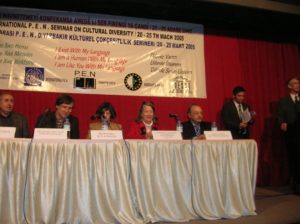
PEN Diyarbakir Conference on Cultural Diversity, 2005. L to R: Mehmed Uzun and Dr. Zaradachet Hajo (Kurdish PEN), Kata Kulavkova, (Chair, PEN Translation and Linguistic Rights Committee), Joanne Leedom-Ackerman, (PEN International Secretary), and Üstün Akmen, Turkish PEN
That evening in opening the conference, I noted, “In Diyarbakir/Ahmed this week we’ve come together to celebrate cultural diversity and explore the translation of literature from one language to another, especially to and from smaller languages. The seminars will focus on cultural diversity and dialogue, cultural diversity and peace, and language, and translation and the future. This progression implies that as one communicates and shares and translates, understanding may result, peace may become more likely and the future more secure.”
The official program began with the Lord Mayor and the President of Kurdish PEN Dr. Zaradachet Hajo and the President of Turkish PEN Mr. Üstün Akmen and a keynote speech by Kurdish author Mehmed Uzun. The following evening Turkish writer Murathan Mungan delivered an introductory address to a public gathering.
At the conference itself Kurdish and Turkish writers, poets, publishers and translators shared history and literature across their linguistic borders. Through discussion and readings and performances, they addressed the importance of cultural diversity as a value in a culture of peace.
Renowned Turkish/Kurdish novelist Yaşar Kemal, former president of Turkish PEN, had been invited but was ill and sent a message instead. He noted that the world was going through a difficult period and was faced with terrible destruction. He asked, “What makes human beings? Love, compassion, peace, friendship…Human beings are the only creative beings in the world.” Local cultures are being destroyed and with that is the destruction of languages and art and values, he said. In life and death we have to stand against a terrible destructive force in favor of local and national culture. “I believe your meeting will be successful,” he predicted.
Kata Kulavkova, Chair of the Translation and Linguistic Rights Committee emphasized the importance of the capacity to imagine, the importance of cultural memory and openness to dialogue. “Europe needs all identities, including Kurdish identities,” she said, noting that every culture is the center of the world for itself. “Turkish and Kurdish culture depend on each other to promote Turkish/Kurdish universal culture.”
Hüseyin Dozen of Kurdish PEN noted that literary translation helps a language to flourish; languages that are not standardized are enriched by literary translation which is an art rather than a scientific discipline. As far as languages that have no official status or have been prohibited, oral literature plays a central role, and the work of a translator must not neglect this kind of literature in his work.
PEN Vice President Lucina Kathmann led a discussion on “Bridging Borders” among women writers. Müge Sökmen of Turkish PEN moderated a discussion on Diversity and Literary Translation; Kurdish PEN member Berivan Dosky moderated a discussion on Cultural Diversity and Peace; Turkish PEN’s Vecdi Sayar led the discussion on Cultural Diversity and Dialogue, and Aysu Erden of Turkish PEN moderated a panel on Cultural Diversity and Linguistic Diversity.
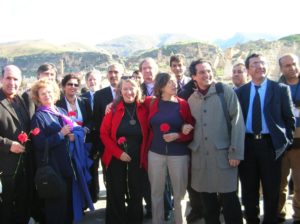
PEN trip to ancient town of Hasenkeyf, Turkey, 2005 including PEN International and Turkish and Kurdish members
One of the highlights of the conference was a visit to Hasankeyf, reputed to be the oldest continuing settlement on the planet and a cradle of civilization. Built into the sandstone cliffs in southeast Turkey, Hasankeyf had yielded relics that dated the site even earlier than the 12,000 years recorded, perhaps as old as 15,000 years. This Kurdish town of southeast Anatolia was threatened by a dam the Turkish government planned to build on the Tigris River. The Ilisu Dam would drown the town as the water was diverted and eventually would submerge Hasankeyf under as much as 400 feet of water.
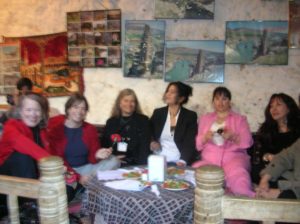
Lunch in a cave in Hasenkeyf, 2005, including PEN International representatives Joanne Leedom-Ackerman, Jane Spender and Lucina Kathmann
As we journeyed up the stone steps to the ruins of Hasankeyf Castle and later as we ate lunch in a cave, then bought small souvenirs from children who lived in the town, our delegation fell in love with the setting and the people. Several of us returned home and began writing about Hasankeyf in an effort to preserve its heritage. We were not alone. Worldwide protests to save this ancient site had been lodged, and the dam had been delayed. I set a google alert so that every time there was mention of the Ilisu Dam, I would know. Lucina Kathmann and I began exchanging latest news.
In spite of worldwide protests, the giant Ilisu Dam was completed after many delays in July, 2019. It began to fill its reservoir, tapping water from the Tigris River and diverting it from Iraq. The rising water levels are now slowly submerging the town of Hasankeyf, flooding the area which had been settled for millennia. The population for the most part has had to move. The waters have risen 15 meters and continue to rise around 15 centimeters per day, according to a February report by Reuters.
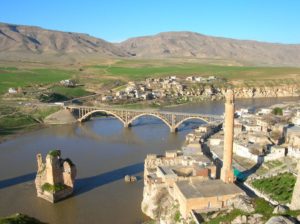
Hasenkeyf, Turkey, March 2005 during PEN Conference on Cultural Diversity, before the Ilisu Dam flooded the region.
Turkey’s rapprochement with the Kurds has also taken a turn away from the opening and the cultural diversity we celebrated in the 2005 Diyarbakir Seminar. But literature was exchanged there; friendships were made, and the dialogue among PEN members continues. Individual by individual has always been the strength and the modus operandi of PEN.
Next Installment: PEN Journey 35: Turkey Again: Global Right to Free Expression
PEN Journey 33: Senegal and Jamaica: PEN’s Reach to Old and New Centers
PEN International celebrates its Centenary in 2021. I’ve been active in PEN for more than 30 years in various positions and now as an International Vice President Emeritus. With memories stirring and file drawers of documents and correspondence bulging, I am a bit of a walking archive and have been asked by PEN International to write down memories. I hope this personal PEN journey will be of interest.
A few days before I flew out to Dakar, Senegal for a PEN conference in November 2004, my youngest son, a Marine in Iraq, called and told my husband and me that we would not hear from him for a while. We knew, without being told, that the U.S. and British troops were likely about to return to Fallujah, the center of the insurgency. Civilians there had been advised to get out of the city, and they were leaving.
On the opening day of the PEN conference in Dakar, November 7, 2004, the battle for Fallujah began. The headlines in the newspapers in Dakar were about the civil war raging in neighboring Ivory Coast so I was not reading about Iraq during the five-day PEN Africa meeting. In 2004 there were no iPhones or phone news feeds and rare coverage of the Middle East was on the evening news. I was quietly attentive each day and prayerful and focused on PEN’s work.
I have modest notes from the first PAN Africa conference, but I have some of my most vivid memories, most particularly of the people I met and of my first trip to Gorée Island just off the Senegalese coast opposite Dakar, a place of its own historic upheaval. Gorée Island was the site of the largest slave-trading center on the African coast from the 15th to the 19th century, ruled successively by the Portuguese, Dutch, English and French. The dungeons and portals to the sea where men and women and children were sent out in chains still stood along with the stucco houses of former slave traders.
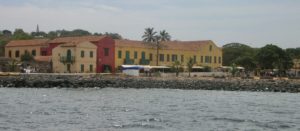
Gorée Island, site of slave trading in 15-19th centuries, off coast of Dakar, Senegal
A tall Gambian doctoral student assisting Senegalese PEN guided a few of us around Gorée. Fluent in French, English and Spanish, he was writing a doctoral thesis on the secrets of history and myth in the epic of Kaabu according to Mandingo oral traditions—clearly a future PEN member. Thoughtful, knowledgeable, he spent the day sharing history. During and after the Dakar meetings, our paths crossed in subsequent PEN conferences and congresses, and we know each other still. Dr. Mamadou Tangara earned his doctorate at the University of Limoges in France shortly after and eventually became the Gambian Permanent Representative to the United Nations. During Gambia’s constitutional crisis in 2016-17, he and other diplomats called for the president to step down peacefully; he was dismissed, but when power changed hands a few months later, he was reappointed as Minister of Foreign Affairs for the Gambia. The friendship with Mamadou Tangara remains and is one of my many valued friendships from PEN.
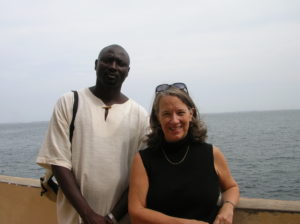
Mamadou Tangara (Gambia) and Joanne Leedom-Ackerman (PEN International Secretary) on Gorée Island at PEN’s 2004 Dakar conference
Mamadou’s mentor at the time was an older Gambian journalist and editor Deyda Hydara, who joined PEN members from more than a dozen African centers in this conference to prepare for PEN’s first PAN African World Congress in Senegal in 2007. The Congress would be PEN’s first in Africa since the 1967 Congress in the Ivory Coast when American playwright Arthur Miller was International PEN President. Though the Gambia didn’t yet have a PEN Center, Deyda was planning on starting one. At the time Deyda Hydara was co-founder and primary editor of The Point, a major independent Gambian newspaper. He was also correspondent for AFP News Agency and Reporters Without Borders and was an advocate for press freedom and a critic of his government’s hostility to the media.
A month after PEN’s Dakar conference, the Gambian government passed a bill allowing prison terms for defamation and another bill requiring newspaper owners to purchase expensive operating licenses and register their homes as security. Deyda Hydara announced his intent to challenge these laws. Two days later on December 16, 2004 Deyda Hydara was assassinated on his way home from work. To this day his murder remains unsolved. The following year Deyda Hydara won PEN America’s Freedom to Write Award posthumously and later the Hero of African Journalism Award of the African Editors Forum.
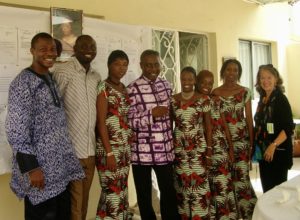
PAN Africa meeting at Senegal PEN offices. PEN L to R: Remi Raji (Nigerian PEN), Mamadou Tangara (Gambia), Mike Butscher (Sierra Leone PEN), Joanne Leedom-Ackerman,( PEN International Secretary) and Senegal PEN assistants
Deyda Hydara was a dynamic voice for writers at the PEN Dakar conference and for the need of PEN’s African centers to work together against repressive press laws.
The theme of the Dakar meeting—“New Partnership for African Development and Culture”—involved coordinating work among PEN’s African centers, including the nomination of a candidate for International PEN’s board at the 2005 Congress in Bled, Slovenia, assistance to dormant African centers and support for creating new African centers. (There are now more than 25 PEN centers in Africa.) Several African PEN centers also committed to working together in fundraising for projects. Remi Raji of Nigerian PEN took on the role of PAN coordinator, and Mike Butscher, executive secretary of Sierra Leone PEN, was the administrator.
PAN (PEN African Network) was relatively new. In 2001 Dr. Vincent Magombe, a Ugandan journalist and member of PEN’s African Writers Abroad Center and member of PEN’s first International Board and Terry Carlbom, PEN’s International Secretary, had taken a trip to visit many PEN African centers in order to promote activity and develop greater participation in Africa. At the 2003 Mexico Congress members from seven of PEN’s African centers met to launch the PEN African Network (PAN). At the 2004 Congress in Norway representatives from twelve African centers came together for a PAN meeting. By Dakar PAN had grown to over a dozen of PEN’s African centers who agreed to help plan the 2007 World Congress in Dakar.
The implementation and heavy lifting for the Congress would depend on PEN Senegal, one of the oldest and best organized of PEN’s centers in Africa. Senegalese PEN had offices, a small theater and even housing for visiting writers, administered by its General Secretary, poet Alioune Badara Bèye. Because the country’s first President (1960-1980) Leopold Sédar Senghor was himself a renowned poet and a Vice President of International PEN, Senegal had a long tradition of support for literature that was unparalleled in most countries.
The Dakar PAN conference opened on the International Day of the African Writer and was coordinated with the Senegalese Writers’ Association and presided over the by the Minister for Culture. The ceremonies included a literary evening along with traditional Senegalese instrumental ensembles and dance.
The planning work for the 2007 Congress got underway the following day in a large meeting room in Senegal PEN’s writers’ compound. As International Secretary, I addressed the gathering and shared a 1922 news report about PEN that began: Le Coeur n’a pas de pays. (The heart has no country) then continued: “Today when many are claiming a clash of civilizations and fear across borders is rising, PEN can continue to demonstrate international fellowship through its literary programs, its work on behalf of imperiled writers, its support of writing in all languages and cultures, its assistance to writers in exile and its development of new centers, particularly in Africa. PEN’s strength is its members, and it is a pleasure to be here with committed writers from some of PEN’s strongest and also PEN’s emerging African centers.”
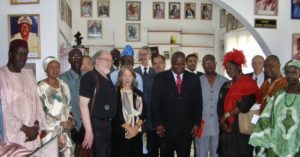
International Day of the African Writer and PEN’s PAN Africa conference at Senegal PEN. Participants, including far left Alioune Badara Bèye, (General Secretary, Senegal PEN), Kjell Olaf (Norweigan PEN), Joanne Leedom-Ackerman (PEN International Secretary/American PEN), Femi Osofisan (Nigerian PEN), Terry Carlbom (Swedish PEN), Senegal Minister of Culture, Deyda Hydara (Gambia), Mike Butscher (Sierra Leone PEN) and other PEN members and officials.
Given the conflict next door in the Ivory Coast and in Iraq, Afghanistan and other areas of the world, it seemed especially important to have these positive actions of fellowship growing. While the PAN conference was serious in purpose, it was also full of comradery. I chaired one session and remember looking out at the table of more than a dozen men and only one woman besides myself. I suggested at PEN’s follow-up conference in Ghana next spring, the centers include their women members. The men looked around the table as though only now noting the imbalance. I smiled. The other woman at the conference Koumanthio Zeinab Diallo from Guinea spoke French, and when the translator repeated my words to her in French, she smiled. C’est vrai! and nodded her approval.
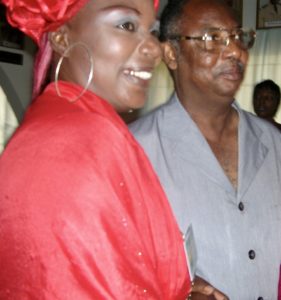
Zeinab Diallo (Guinea PEN) and Deyda Hydara (Gambia) at 2004 PEN PAN Conference in Dakar, Senegal.
Since I had taken on the position of International Secretary, I’d been studying French to get to a passable conversational level. It turned out Zeinab was studying English with the same goal. Mamadou Tangara set up a competition between us which he judged every time the three of us saw each other over the months and years ahead at PEN meetings. Even with our salad of language, Zeinab and I communicated and often laughed together though I don’t think either of us achieved the fluency we wanted. A poet, Zeinab wrote in Pular as well as French. She also worked as an Agricultural Engineer and was a development consultant for the UN Development Programme.
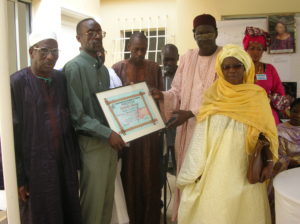
Senegal PEN members including General Secretary Alioune Bedara Bèye presenting tribute posthumously for Senegal writer and member Fatou Ndiaye Sow.
At the PAN conference Senegalese PEN presented an award and tribute to its member Fatou Ndiaye Sow who had passed away just the month before while attending a meeting abroad. A poet, teacher and children’s writer, Fatou had been a friend to many of us and was an early member of PEN International’s Women’s Committee. I read a tribute to Fatou by Lucina Kathmann, a close friend of hers and early chair of PEN’s Women’s Committee.
When I took on the role of International Secretary a few months before, there was already a full agenda underway, and I was grateful to Terry Carlbom, my predecessor, and to Jane Spender, the Administrative Director; Terry also attended the Dakar conference. The next three PEN Congresses were lined up to be developed—Bled, Slovenia in 2005, Berlin, Germany in 2006, and Dakar, Senegal in 2007. Each of these would be hosted by experienced PEN centers so while much work was yet to be done and funds raised for these Congresses and for other activities ahead, solid groundwork had been laid.
A new initiative in those early days as International Secretary was to revive and develop PEN’s presence in the Caribbean. The request originated with the UNESCO representative in Jamaica who was himself a writer. A proposal to explore the possibility was developed in partnership with Canadian PEN’s Executive Director Isobel Harry, who’d spent time in Jamaica, had known one of its most famous residents, musician Bob Marley, and knew numbers of Caribbean writers living in Toronto, some of whom were members of Canadian PEN.
Historically, the Caribbean had been underrepresented in PEN except for the existing Puerto Rican Center and a Jamaican PEN Center that had been active from 1948 until the early 1980’s but had disbanded in 1987.
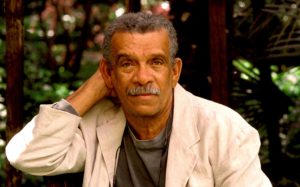
Poet/playwright Derek Walcott, winner 1992 Nobel Prize for Literature. (photo credit: Effigie/Leemage/Writer Pictures)
The Caribbean was enjoying a literary renaissance with events like the CARIFESTA (Caribbean Festival of the Arts), the Calabash Literary Festival and with St. Lucia’s Derek Walcott winning the Nobel Prize for Literature.
In early December, 2004 Isobel and I traveled to Jamaica to meet with writers, professors and UNESCO to determine who and how a PEN center might be launched. PEN Canada had an ongoing relationship with Caribbean writers as did Quebecois PEN, which was working with Haitian writers to help develop a PEN center there. Haitian writer Georges Anglade, who lived part time in Montreal and was the founding President of Haitian PEN, had recently attended the PEN Congress in Tromso, Norway. (Ref Haitian Farewell)
At the minimum, to form a new PEN center at least 20 qualified writers have to come together, sign and agree to commit to the Charter of PEN and propose a reason and program for their center.
Isobel and I flew to Kingston, arriving from the early blasts of winter into the Jamaican sun. It was not hard duty. Over the course of three days we met with a dozen writers, professors, festival organizers, human rights activists and the UNESCO representative Alwin Bully, who was also Chair of the CARIFESTA Task Force. UNESCO’s mandate was to integrate the Caribbean, and Alwin Bully saw PEN as a unifying organization and thought a PEN Center might include writers from many of the Caribbean islands.
Isobel and I met with him several times as well as with the founders and producer of the Calabash International Festival and with journalists from the Jamaica Observer, professors at the University of the West Indies, chief curator of the National Art Gallery, the Vice Chancellor of the University of the West Indies, and the former head of the Human Rights Council. All were enthusiastic about the possibility of a PEN Center.
Colin Channer and Kwame Dawes, founders of the Calabash International Literary Festival, offered to host a planning meeting before the next festival. UNESCO offered to fund the workshop/planning session and include writers from many Caribbean countries. The Vice Chancellor of the University of the West Indies, which had three main campuses in Barbados, Trinidad and Jamaica, said the university could perhaps provide institutional support. Professor Carolyn Cooper of the Department of Literature in English and board member of the Calabash Festival and a writer said she’d be glad to be a founding member and help recruit so that the PEN center had an inclusive group of all types of writers.

L to r: Novelist Colin Channer (photo credit: Allison Evans), poet Kwame Dawes (photo credit: Andre Lambertson), founders of Calabash International Literary Festival, and Professor Carolyn Cooper of the University of the West Indies (photo credit: Isobel Harry)
Florizelle O’Connor, the former head of the Human Rights Council and member of the UN Sub Commission on Human Rights was also enthusiastic about a PEN center. She felt the right to freedom of expression and access to information were issues that needed protecting in Jamaica and the Caribbean.
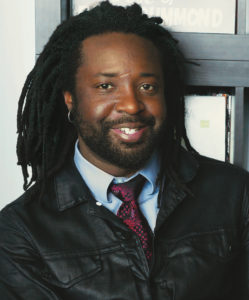
Novelist Marlon James, 2015 Man Booker Prize winner
Questions arose on where a Caribbean PEN center would be located—Jamaica, Trinidad, other? Other writers, including journalists from the Jamaica Observer, emphasized that a center would need equal representation of writers and journalists and no one constituency should be keeper of the PEN flame.
Writers who lived part time in Jamaica and part time in Toronto, New York, London and elsewhere noted that most writers far from home sought ways to keep strong the bonds and identity with the Caribbean; a PEN center could help. Each interview resulted in a list of at least four to six more people to speak with, including later Marlon James, who would eventually win the Man Booker Prize.
At the end of our three-day trip circling Kingston aglow with red, green and gold Christmas lights and swaying palm trees, we concluded a PEN Center would happen. At its best it could bring together writers, journalists and creative people in the islands and provide further access to each other, broaden access to the world of literature and enable writers to present a collective voice for greater impact on issues such as freedom of expression.
The writers would have to decide the questions ahead—who would be eligible, the balance of journalists and creative writers and the diasporic writers whose numbers might exceed the local writers. A large unresolved question was whether the PEN center would be Jamaican PEN as in the past or a pan-Caribbean PEN.
As we left the island to return to our winter, it was agreed the discussions would continue among the writers, including those Caribbean writers in New York, Toronto and London and with UNESCO. A workshop/planning meeting in association with the Calabash Festival and the University would be held, probably in May 2005. Isobel would return.
In 2006 the Jamaica Center was voted into PEN at the Berlin congress and joined over 135 PEN centers worldwide.**
Next Installment: PEN Journey 34: Diyarbakir and Beyond—Finding Byways for Peace
——————-
*Current African PEN Centers: Afar, Afrikaans, Algerian, Egyptian, Eritrean in Exile, Ethiopian, Gambian, Guinea-Bissau, Guinean, Ivory Coast, Kenyan, Liberian, Malawian, Malaysian, Mali, Mauritania, Moroccan, Nigerian, Senegal, Sierra Leone, Somali-Speaking, South African, Togo, Tunisian, Ugandan, Zambian, Zimbabwe
**Current Caribbean PEN Centers: Cuban, Haitian, Jamaican, Puerto Rican
PEN Journey 32: London Headquarters: Coming to Grips
PEN International celebrates its Centenary in 2021. I’ve been active in PEN for more than 30 years in various positions and now as an International Vice President Emeritus. With memories stirring and file drawers of documents and correspondence bulging, I am a bit of a walking archive and have been asked by PEN International to write down memories. I hope this personal PEN journey will be of interest.
PEN is a work in progress. It has always been a work in progress during its 100 years. Governing an organization with centers and members spread across the globe in over 100 countries can be like changing clothes, writing a novel and balancing a complex checkbook all while hang gliding. Perhaps an exaggeration, but not by much.
In 2004 the leadership of President and International Secretary were at the center of the governing structure along with the Treasurer and a relatively new Board. The President represented PEN in international forums. The International Secretary was tasked with overseeing the office and the centers of PEN and with any tasks the President handed over like running board meetings and setting up the agenda for work. The concept was that PEN should be able to elect as President a writer of international stature to represent PEN in global forums but not have the obligation to run the organization. That could be the role of the International Secretary, along with the Board and staff.
When I assumed the role of International Secretary, PEN did not yet have an executive director, though the consensus had built from the strategic planning process that we needed one. Both the President and International Secretary were volunteer, unpaid positions, which meant they were not full time. At the post-Congress board meeting after Tromsø, we agreed to begin a search for an executive director.
I suggested monthly board meetings, which had not been the practice. We could do these by phone, which meant there were only a few hours a day when everyone would be awake. If Judith Rodriguez in Melbourne, Australia could stay up past 11pm and Eric Lax in Los Angeles didn’t mind waking up at 7am, the rest of us—Takeaki Hori in Japan, Sibila Petlevski in Croatia, Eugene Schoulgin in Norway, Elisabeth Nordgren in Finland, Cecilia Balcazar in Colombia as well as President Jiří Gruša when he joined from Vienna or Prague and me in Washington, DC or London—could find our time zone and call in. The technology was not as sophisticated as today, and we didn’t yet use skype so the calls were not cheap, but we began to manage each month.
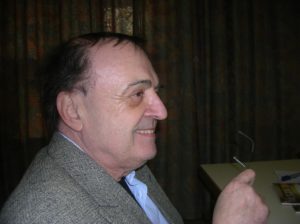
International PEN President Jiří Gruša
As International Secretary, I was in charge of overseeing the office and staff, working with centers on conferences and projects and along with Jiří, liaising with our partners like UNESCO. Administrative Director Jane Spender and I drew up the agenda for each board meeting. I always checked with Jiří to see if he had items to add and to see if he wanted to join the board meeting. I chaired most of the board meetings and much of the Assembly of Delegates at the Congresses. English was not Jiří’s first or second language, and he had other large obligations. During his presidency, he took on the Directorship of the Diplomatic Academy of Vienna, where we held our winter board meetings. This division of tasks between Jiří and me was quite different when the next President John Ralston Saul took on the presidency in 2009, along with Takeaki Hori as International Secretary. John was a much more hands-on President than Jiří. The President and International Secretary were a team and usually agreed between them who would do what.
One of my most important and enjoyable partnerships was with Administrative Director Jane Spender, who was promoted to Program Director for Jane had been instrumental in the thinking and execution of PEN International programs first years. I tried to spend at least a week to 10 days each month in London or on the road for PEN. I was able to finance my travel outside of PEN’s budget. Jane and I worked closely together as we outlined what yet needed to be done in PEN’s move to modernize systems. Each International Secretary had operated in a way that worked for the time. In my tribute to retiring international Secretary Terry Carlbom, I’d noted that early in PEN’s life, around 1924 at a meeting in Vienna, the French representative had turned to the German representative and said, “PEN means Paix Entre Nous (“Peace between us.”).* Members did not always agree with each other and would perhaps even get angry, but the hope was that members would honor and serve that acronym well.
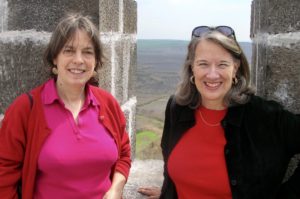
L to R: International PEN Program Director Jane Spender and PEN International Secretary Joanne Leedom-Ackerman at the wall surrounding Diyarbakir, Turkey in March, 2005.
After Terry debriefed me at the PEN Congress in Tromsø, one of my first visits was to Paris to talk with former International Secretary Alexander Blokh, who had held the position for 17 years, to listen to his experience. The times and the demands were changing from Alex’s day as PEN grew and as the world sped up and shrank at the same time with the advent of the internet.
One of my early calls was to George Gawlinski, who had taken PEN through the strategic planning process in Bellagio in 2003 (see PEN Journey 28). George’s advice was that we hire an interim executive director while we did a search for an executive director. He said he happened to know that one of the best in that business was available, a man named Peter Firkin. He could come in, help us get systems in place like employment policies which we didn’t have, a budget which we didn’t have and help set up the systems the office would need to appeal to a first rate executive director and also begin relieving the impossible workload Jane and the staff bore. Jane and I interviewed Peter together. After about twenty minutes (or less), we exchanged relieved glances over the table and knew we had found who we needed for that moment.
A grey-haired New Zealander with wide experience with organizations and a love for books, Peter spoke with the Board and Jiří, and PEN hired him to come in several days a week to begin helping, including assisting in the search process. My notebook of lists had already grown quite full, and now these lists Jane and I allocated among the three of us. One of the big tasks was to develop an overall budget for the organization. The Writers in Prison Committee operated with a budget, but the rest of the organization operated project by project and at the end of the year, a list of expenses and income was recorded. There was not a budget projected forward for the whole organization, rather an accounting of money spent and money received. The only way to draw up PEN’s first budget was to look at what was spent the year before and project forward. The budgeting processes also needed to be set in place. American PEN sent over its financial director to work with the London office for a week with Jane and Peter and the Treasurer Britta Junge Pedersen and bookkeeper Kathy Barazetti. It took a while, but we eventually had a comprehensive, estimated budget for the whole organization.
Another task was to revise our status with the British Charity Commission, which oversaw all charities in Britain. The work of human rights organizations had been regarded as being political in nature, therefore not permitted charitable funds. Some organizations like International PEN had set up charitable trusts—the International PEN Foundation—to raise funds for their educational work. But with a change in the law, human rights organizations were now accepted as a-political. With Peter’s help we found a law firm that could take us through the process to dissolve the International PEN Foundation so International PEN could operate as one charitable organization.
We also found new and highly respected auditors. All these were the nuts and bolts on the continued journey to improve and modernize International PEN. During Terry Carlbom’s tenure as International Secretary, we had gotten rules and regulations and procedures updated and approved and the strategic planning process underway. The tasks and lists to get International PEN operating more efficiently seemed endless, but each day Jane and I checked more items off the lists.
We hired a highly recommended search firm, which Human Rights Watch had used successfully. Jane and Sara made it clear they did not want to be considered for the position of executive director. Jane was made the Program Director and Sara remained the Director of the Writers in Prison Committee. The board set up a committee to oversee the search, to read resumes given us, help set out the tasks and interview questions for finalists and ultimately to interview final candidates. The committee included Eric Lax, Eugene Schoulgin, myself, and Peter Firkin. We consulted closely with Jane and Sara who also interviewed the finalists.
All of this work related to the systems of the organization and were interesting and enjoyable because of the colleagues I was working with even with long hours and sandwiches for dinner at the office. But the most fun was the programs and going out into the world and working with writers. My first trip was to Dakar, Senegal, where one of our oldest African Centers had committed to host the 2007 PEN Congress and was bringing together all the African centers for a conference. One of PEN’s early Vice Presidents had been poet Leopold Senghor, who was also the first President of Senegal. A sentence I wrote and memorized before going there I remember to this day: Il n’a que qelques autre pays dans le monde ou l’ecrivain est plus honore qu’au Senegal. “There are few countries in the world where the writer is more honored than in Senegal.”
In December I left for Jamaica with Canadian PEN’s executive director Isobel Harry. Writers in Jamaica, along with UNESCO’s representative there, wanted to start a PEN Center for the Caribbean.
*P.E.N. acronym stands for Poets Essayists and Novelists; along the way it expanded to Poets Essayist/Editors and Novelists
Next Installment: PEN Journey 33: Senegal and Jamaica: PEN’s Reach to Old and New Centers
PEN Journey 31: Tromsø, Norway: Northern Lights
PEN International celebrates its Centenary in 2021. I’ve been active in PEN for more than 30 years in various positions and now as an International Vice President Emeritus. With memories stirring and file drawers of documents and correspondence bulging, I am a bit of a walking archive and have been asked by PEN International to write down memories. I hope this personal PEN journey will be of interest.
The week before PEN’s 70th World Congress in Tromsø, Norway in the Arctic Circle, my oldest son competed in the Athens 2004 Olympic Games, the only wrestler to qualify for TeamGB (Great Britain). He had dual citizenship and was the first British champion to qualify for the Olympics in wrestling in eight years. In his sport, there was no seeding of competitors; instead, after making weight, each wrestler reached into the equivalence of a hat and drew their first round competitions. True to his history, my son drew the best opponents. As one news commentator noted: “Coming to the mat is Nate Ackerman, born in the US, wrestling for Great Britain, getting his PhD in mathematics at the Massachusetts Institute of Technology…but that won’t help him now as he faces the three-time World Champion from Armenia.” My son lost to the Armenian wrestler. His other opponent was the world bronze medalist from Kazakhstan who went on to win the silver medal at the Olympics. Though my son didn’t win either match, he also didn’t get pinned, and he wrestled nobly. The Olympic Games in Athens was a magical time.

Olympic circles projected in light on the Acropolis at the 2004 Olympic Games in Athens
I was heading to Tromsø with a smile inside, though behind my smile was also a quiet attention that never left me for my youngest son, a Marine, was in Anbar Province, Iraq that summer, patrolling in 120° and alert for IED’s and snipers along the roadside. He had missed his brother in the Olympics and his brother missed being able to talk with him.
As I changed planes in northern Europe, I realized I was going to need a coat in the Arctic Circle and bought a light foldable one at an airport shop which I took to a decade worth of PEN Congresses after. On the plane I reviewed the stack of PEN papers and resolutions.
I was arriving at the Congress having agreed to stand for International Secretary. (See PEN Journey 30). The other PEN member standing was Giorgio Silfer, a poet and playwright and president of Esperanto PEN.
Norwegian PEN hosted over 300 writers, editors, and translators from at least 60 countries for the 70th World Congress whose theme was Writers in Exile—Writers in Minority Languages. The Rica Arctic Hotel where we stayed and met was an easy walk to the small downtown of Tromsø, capital of northern Norway, well above the Arctic Circle and called “the Paris of the North.”
Kjell Olaf Jensen, President of Norwegian PEN, reminded delegates that the Congress themes reflected the literary scene of Tromsø, which would soon join the International Network of Cities of Asylum as the fifth Norwegian city. (This network later developed into the International Cities of Refuge Network (ICORN) in 2006 with PEN’s Writers in Prison Committee as a partner and with the inaugural meeting in Stavanger, Norway.) One of the guiding voices in the exile network Professor Ole Danbolt Mjøs, director of Tromsø University’s Peace Center and President of the Norwegian Nobel Committee, spoke at the Welcome Party Ceremony as did Ole Henrik Magga, President of the Sami Parliament. Half of the estimated 50,000 Sami in the world lived in Norway. Crown Prince Haakon of Norway officially opened the Congress the next day noting, “Freedom of speech is a source of power. If used constructively, it is amazing what speech can do. It can fight corruption, free political prisoners, and make oppressive regimes crumble.”
The two themes of writers in exile and writers in minority languages intertwined throughout the Congress with readings and round tables at cafes and pubs in the midst of Tromsø’s annual International Literary Festival and the International Nana Festival of Aboriginal people. Literary and musical programs included the Sami singer Mari Boine in the Arctic Cathedral and the work of the celebrated but deceased Sami poet, singer, and writer Nils Aslak Valkeapaa. PEN’s programs highlighted some of Norway’s own writers in exile: Mansur Rajih from Yemen, Soudabeh Alishahi from Iran, Islam Elsanov, a film maker from Chechnya, and Chenjerai Hove from Zimbabwe as well as guests Reza Baraheni (Iranian writer living in Canada), Turkish activist Şanar Yurdatapan, and former Russian prisoner and writer Grigory Pasko.
A conference at Tromsø University under the theme “Should Writers Live in Prison?” preceded the Opening Ceremony. Storyteller Easterine Iralu of the “Nagaland nation” addressed the delegates in the main lecture hall: “Every man is a story and every nation is a bristling galaxy of stories. Every nation should be given the right to tell the story by its own story tellers…We are an oral society. Naga writing is an aboriginal achievement.”
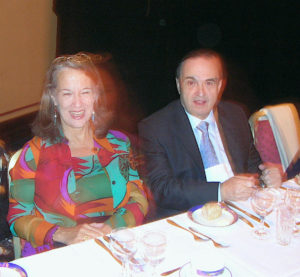
New PEN International Secretary Joanne Leedom-Ackerman and PEN International President Jiří Gruša at 70th PEN Congress in Tromsø, Norway, 2004
In later panels Lebanese novelist Amin Maalouf said, “Poets and writers must reinvent the world. This is not a task to be left to politicians. Is this a century of bombs or poems?” Norwegian bestselling author Jostein Gaarder expanded the questions: “How wide are the ethical horizons of literature and art? The question for writers and artists at the start of the third millennium must be what shift in consciousness do we need? Literature is nothing less than a celebration of mankind’s consciousness. So shouldn’t an author be the first to defend human consciousness against annihilation?”
At his first Congress as PEN International President Jiří Gruša told the delegates, “I myself have experienced persecution and really esteem people who help authors to freedom. I know how vital it is to have somebody outside the prison who cannot be stopped. ” He challenged writers to invent and combine practical and stylistic literary methods “to conquer plagues and pestilence that threaten human, moral and planetary evolutions.” He and the delegates of the Congress condemned recent terrorist attacks on a school in Beslan, Russia which had taken the lives of hundreds of children just a few days before. Jiří also paid respect to poet, Nobel laureate and PEN member Czeslaw Milosz, who had recently passed away. “It is with deep grief that the PEN family sympathizes with the people of Poland. We shall miss him, but his work will continue to inspire people from one end of the world to the other.” Milosz was a member of the Writers in Exile American Branch of PEN.
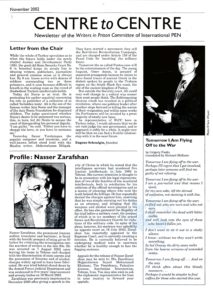
Writers in Prison Centre to Centre newsletter featuring poem by Grigory Pasko, honored guest at 70th PEN Congress and article about prisoner Nasser Zarafshan.
In addition to attending the rich literary panels and discussions, PEN’s Assembly of Delegates passed a resolution that urged authorities to assist in freeing Christian Chesnot and Georges Malbrunot, two French journalists currently held hostage in Iran. Encouraged by Nicaraguan poet Ernesto Cardenal, delegates and participants also signed a petition to the Islamic Republic of Iran demanding that Dr. Nasser Zarafshan’s life be protected and that he be immediately and unconditionally released. Delegates also signed a petition to the President and Government of Russia calling for a multilateral dialogue and an end to the violence in Northern Caucasia and a restoration of civil living conditions in the Chechnyan Republic, including open access so that local and national media could report events in the region. (Chesnot and Malbrunot were released from Iran a few months after the Congress, in late December, 2004. Zarafshan was not released until 2007.)
The Assembly passed resolutions from the Translation and Linguistic Rights Committee (TLRC) urging authorities of the Russian Federation to grant cultural rights to all minorities, including use of regional languages, and the same appeal was sent to authorities in Turkey, Iran and Syria regarding Kurdish language and culture.
Writers in Prison Committee (WiPC) resolutions which the Assembly passed focused on the repression of free expression for writers seeking asylum in Australia, on harassment of certain journalists in Canada, attacks on writers in Chechnya, imprisonments in China and Cuba, censorship and harassment of writers in Egypt, arrests in Eritrea, hostage-taking in Iraq, detentions in the Maldives, killings in Mexico, detention and ill treatment in Myanmar, murder in Nepal, killing and disappearances in Russia, bombings and assassinations in Spain, imprisonments in Turkey, restrictions on the free flow of international writing in the U.S., imprisonments in Uzbekistan and Vietnam, and restrictions on free expression in Zimbabwe.
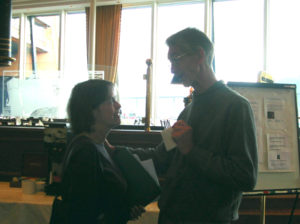
Administrative Director Jane Spender and PEN International Secretary Terry Carlbom at 70th PEN Congress in Tromsø, Norway, 2004
The WiPC resolutions had been discussed at the earlier Writers in Prison Committee meeting where a new chair had been elected from four candidates. Karin Clark of German PEN would replace Eugene Schoulgin, who was stepping down after four years and was running for the Board of International PEN.
At the Assembly of Delegates, Eugene introduced guest of honor, former Russian main case and journalist Grigory Pasko, who told the delegates that “although he had not been able to thank all those who had worked on his behalf while he was in prison, he now would like to thank everyone again and again. Unfortunately he could not now say that Russia had become more democratic, but he would continue to fight to make it so, supported by all his friends in the Assembly hall.”
Election for the Board of PEN included eight candidates for three open positions. Eric Lax (PEN USA West), Judith Rodriguez (PEN Melbourne), and Eugene Schoulgin (Norwegian PEN) joined the Board. Three new centers—Basque, Guatemala and Kosovo—were admitted into PEN.
At his last Assembly as International Secretary Terry Carlbom told the delegates, “Our greatest strength is ultimately our capacity for empathy, compassion and solidarity. Ours is not the solidarity of the collective herd; it is the solidarity of the concerned and caring individual, a solidarity with a fragile world and fragile civilization. And the solidarity that sometimes can provide comfort in the rather lonely process of creative writing…I have been proud to serve.”
At the Congress Terry saw the passage of the final amending resolutions on the Regulations and Rules of Procedure he had dedicated a significant portion of time to as International Secretary. Updating rules and regulations to bring them in line with the changes PEN had made to its governance was not a task for many writers. I was grateful to Terry that these documents were now drafted and a working document for strategic planning was in hand.
The election for Terry’s replacement as International Secretary was between Giorgio Silfer (Esperanto PEN) and myself. Giorgio’s speech to the Assembly was a poem, an unusual and memorable presentation for office. Giorgio was a linguist and a poet and participated actively on the Peace Committee and Translation and Linguistic Rights Committee. I was a novelist and journalist and activist on the Writers in Prison Committee and Women’s Committee. We had both worked with all committees, but we had our corridors and respected each other. My statement was more traditional.
I was elected the new International Secretary of PEN. I glimpsed the work ahead when I sat down with Terry in the hotel lounge after the election. He told me in November I needed to be at Senegal PEN‘s conference with African centers in Dakar in preparation for the 2007 PEN Congress there, and in the spring I was in charge of a conference PEN was holding in Diyarbakir, Turkey with Kurdish and Turkish PEN. Great, I said. Can you show me the budget and program for the Diyarbakir conference? Terry explained that we didn’t have a budget yet, but he offered to continue helping with this conference. I was to learn quickly that unlike the Writers in Prison Committee, the rest of International PEN worked in a more unstructured fashion, without clear budgets but with relationships that usually came through. I began making lists. My tenure as International Secretary would include notebook after notebook of lists of tasks to be done.
A solace as I left that meeting was that I would be working with Jane Spender, Administrative Director, who was smart, a friend, and had gotten PEN through remarkably tight places before. Jane and I both knew that time was not on our side if we didn’t modernize further. I put on my new PEN coat and went for a brisk walk with Jane in the drizzle towards the next venue. PEN International had been asked for the first time by a major funder to provide an evaluation of a major grant. No one before had asked that of PEN, but it would surely be asked more and more in the future. We walked down the wet Tromsø streets considering what was before both of us. We had to figure out how to do an evaluation and much more…
Next Installment: PEN Journey 32: London Headquarters: Coming to Grips
PEN Journey 30: Barcelona: A Surprise
PEN International celebrates its Centenary in 2021. I’ve been active in PEN for more than 30 years in various positions and now as an International Vice President Emeritus. With memories stirring and file drawers of documents and correspondence bulging, I am a bit of a walking archive and have been asked by PEN International to write down memories. I hope this personal PEN journey will be of interest.
I was having lunch with my husband at a Georgetown restaurant in Washington, DC on a Saturday in May, 2004. I was due to fly out the next day for Barcelona to attend International PEN Writers in Prison Committee’s 5th biennial conference, part of a larger Cultural Forum Barcelona 2004. My husband and I were talking about our sons—the oldest was getting a PhD in mathematics and was also training for the 2004 Olympics as a wrestler, hoping to make the British team. (He had dual citizenship.) The younger, recently graduated with an advanced degree in International Relations, had just deployed to Iraq as a Marine 2nd Lieutenant and was heading into a region where the war was over but the insurgency had begun. It was an intense time for our family, yet as parents there was not much we could do except to be there, cheering for our oldest at his competitions and writing letters and sending packages and prayers for our youngest. It was a time when as parents we realized our children had grown beyond us and were taking the world on their own terms.
I was planning to be away for the week in Barcelona where PEN members from around the world were gathering for the Writers in Prison Committee (WiPC) and Exile Network meetings. Carles Torner, PEN International board member, chair of PEN’s Translation and Linguistic Rights Committee and former President of Catalan PEN, had helped arrange International PEN’s participation and funding as part of the Universal Forum of Cultures—Barcelona 2004. This would be the largest WiPC conference to date with delegates from every continent and multiple speakers and side events.
Carles, a poet, fluent in PEN’s three official languages English, French and Spanish, was one of the highly respected, organized and talented PEN members. He’d also been involved in the years’ long reformation of PEN International. As members looked to who could be a strong replacement for the current International Secretary when Terry Carlbom’s term ended in a few months, there was widespread enthusiasm for Carles to stand for the office. I was among the enthusiasts.
My phone rang at that Saturday lunch. International PEN Board member Eric Lax, already in Barcelona for meetings, said he had news and a question; he told me he was calling on behalf of others as well. The news: the Catalan government had also recognized Carles’ talents and had offered him a position as Director of Literature and Humanities Division at Institut Ramon Llull to promote Catalan literature abroad. A father of three, Carles had accepted this paid position which meant he couldn’t stand for PEN International Secretary, an unpaid position. He wouldn’t have the time for both, and there would be conflicts of interest.
Eric asked if I would allow myself to be nominated. A number of members and centers, including the two American centers, were asking, he said. PEN’s Congress where the election would take place was only a few months away in September and nominations were due soon. I was flattered but said no for a number of reasons. Eric asked that I not answer yet, just come to Barcelona, talk with people and let them talk with me.
The International Secretary who worked with the Board and President to run International PEN was not a position I aspired to, but I agreed to come to Barcelona with an open mind. I’d worked with PEN in various roles, including as Chair of the Writers in Prison Committee, for over 20 years. I’d been both inside and outside the reform process that was going on. I understood, at least in part, what PEN was aiming towards and what it would take for this sprawling organization to operate competitively among nongovernmental organizations in the 21st century. I’d sat on boards of several global nonprofit organizations, including Human Rights Watch, Save the Children and the International Crisis Group.
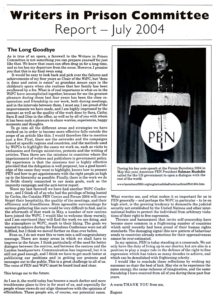
PEN Writers in Prison Committee Center to Center newsletter Spring, 2004
In Barcelona delegates from a number of PEN centers urged me to stand for the office. I asked whether they thought this was the time for an American to take on this leadership role given the controversy over US engagements. “We don’t think of you as American,” some said, perhaps because I’d also lived in Europe for six years during my work with PEN.
I kept my own personal life quiet as I always did, but I did share with Carles, who was urging me to stand, that I had a son in the Marines in Iraq and was committed to him. I didn’t want to get involved in political controversies over the war. “Your focus has always been on freedom of expression,” Carles reminded me. PEN was not an anti-war organization; its focus was on protecting freedom of expression for writers to agree or disagree on issues, not to take political positions unless relating to abuses of human rights.
Mike Roberts, PEN American Center’s Executive Director, was among those encouraging me to stand for the office. He said American PEN would support me however they could with help and advice. We both understood that the organizational models of many American nonprofit organizations could benefit PEN, including the need to have a paid executive director. There was much to be said for the culture of the volunteer which PEN operated in, but given how complex and widespread PEN’s work had grown, it was going to be more and more difficult to compete for funding if there was not a paid professional executive director in the international office in addition to the talented administrative staff and Board of PEN. Certain funders were already telling us as much. Case in point was that Carles, an experienced literary organizer with a family to support, simply could not afford to take on such a demanding position gratis. Eugene Schoulgin, chair of the Writers in Prison Committee, also encouraged me. I left Barcelona thinking deeply about standing for this position which would require significant time and travel.
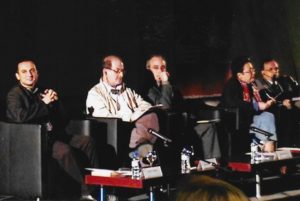
PEN Program at Cultural Forum Barcelona 2004. L to R: Carles Torner, International PEN Board Member and director for PEN conference, Salman Rushdie, President American PEN, Josep Bargalló, First Minister of Catalonia, Dolors Olier, President Catalan PEN
That question absorbs many of my personal memories about the Barcelona conference. I remember the impressive venue and the conversations with friends and colleagues and the many presentations, including by Anna Politkovskaya and an opening talk by Salman Rushdie, the new President of American PEN who called for the US government to open a wider dialogue with the world.
Fortunately, I have papers from the 2004 Writers in Prison Committee meetings. We met over five days and also joined public discussions on literature and memory and the responsibility of writers during times of war. The WiPC continued its focus on issues of impunity and the effect of anti-terror legislation on free expression as documented in PEN International’s two reports issued the previous year.
Joan Smith of English PEN reported that anti-terror legislation was having an impact with democratic countries reacting out of fear to the events of September 11 and either tightening existing legislation or implementing new legislation. Countries such as Cuba were taking advantage for as attention deflected from them, they were cracking down on more dissidents. Countries such as Uzbekistan and other Central Asian countries were using the war against terrorism to win support from the US and western Europe.
Müge Sökmen of Turkish PEN spoke of the danger of silencing dissident voices, a move that would lead to an increase in state terrorism. Since the 9/11 attacks in the US there had been a 20% increase in the number of imprisoned writers. The lifting of Article 8 of the Turkish Anti-Terror Law was welcomed but was in the context of Turkey’s bid for acceptance into the European Union.
Ragip Zarakolu, a Turkish publisher, and Martxelo Otamendi, director of a Basque newspaper, reported to the meeting on their experiences of repression and imprisonment under the anti-terror laws.
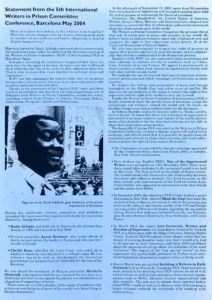
Report on 5th International PEN Writers in Prison Committee Conference as part of Barcelona Forum 2004, including preliminary meetings in London, New York, Istanbul and Ottawa.
Nigerian writer and journalist Kunle Ajibade, who had been sentenced to life imprisonment in 1995 for “conspiring to overthrow the government,” had been freed in 1998 in part because of PEN’s work. But he told the group, “Many of us have been asking, is this what we went to jail for? What has all our struggle come to? A mere clearing of the path for another set of murderers and looters? Right now, a cloud of despair hangs over us.”
Ali Lmrabet, Moroccan journalist, who had been sentenced to three years for insulting the King, also spoke. However, Cheikh Kone, a journalist from the Ivory Coast who’d fled to Australia, had been denied a visa to Spain and so an empty chair was placed at the speaker’s table. Kone had been detained since 2001 in a refugee camp in Australia and was finally released in July 2003 after PEN’s campaign, but the Australian government had invoiced him for $89,000 for the cost of his detention.
Aaron Berhane, an Eritrean journalist who fled to Canada in 2002 reported his situation and the help International PEN’s WiPC and Canadian PEN had given through the Writers in Exile Network. The Network, started in 1994, was currently chaired by PEN Canada and included PEN centers in Austria, Switzerland, Sweden, Norway, England, USA West, and Germany and had helped exiles from Cuba, Sierra Leone and other countries.
A panel with representatives from OSCE, UNESCO, the UN Human Rights Commission, the International Publishers Association (IPA), and the International Freedom of Expression Exchange (IFEX) gathered with PEN to explore cooperation and joint work around issues of freedom of the media, including campaigns on individual cases and pressure on countries to change their laws to conform to democratic standards.
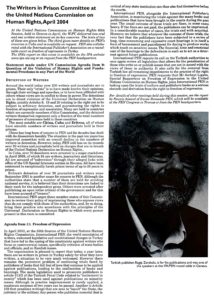
Report on PEN Writers in Prison Committee statement to UN Commission of Human Rights, April, 2004
Ambeyi Ligabo, Rapporteur on Freedom of Expression in the office of the UN Commissioner on Human Rights said he believed the two new threats to freedom and liberty were terrorism and anti-terrorism legislation. He was concerned that countries such as Denmark which professed to be a beacon of democracy were actually denying liberties to their citizens. He was concerned that legislation introduced in some African countries had undermined the progress human rights campaigners had achieved, and he urged collaborative efforts in fighting new threats to free expression.
The WiPC Steering Committee, which consisted of representatives from ten PEN centers, presented its report with suggestions for WiPC headquarters and for the PEN centers on how to expand PEN’s work, its outreach, its funding and its cooperation. A three-year plan was adopted.
The final work of the WIPC conference was an agreement on a campaign calendar for 2004-2005 with an over-arching theme on the issue of Freedom of Expression and Anti-Terrorism.
In accepting PEN’s WiPC statement on freedom of expression from the conference whose theme was “The Value of the Word,” Catalonia’s Minister of Culture declared: “The word is an inspiration for the imagination, a means for peace and a vehicle for freedom. Literature and the word must always be above conflict. PEN has been in the forefront in the fight to secure the value of the word. The value of the word is a guarantee for a better world and more necessary than ever.”
It was agreed the next WiPC Conference would be held in Istanbul in 2006, hosted by Turkish PEN.

La Sagrada Familia—Gaudi Cathedral—in Barcelona, Spain
Before I left Barcelona, I went to visit the Gaudi Cathedral (La Sagrada Familia) which I’d first seen at PEN’s 1992 Barcelona Congress where I’d been so impressed by its majesty and complexity, I wanted to return. Architect Antoni Gaudi had originally planned a cathedral with 18 Gothic spires, but he got hit and killed by a trolley before his elaborate design was realized. Over 100 years later, the cathedral was still unfinished. Gaudi had applied for a construction permit in 1885 but no one ever answered. (It took the city 137 years before a building permit was finally issued in 2019, along with a $5.2 million fee.)
Gaudi defined architecture as the “ordering of light” so that the sun shined differently on the cathedral stones at each moment of the day, producing the myriad effects of light. In the intervening years others had worked to complete Gaudi’s design, but the cathedral remained unfinished. It was nonetheless a magnificent architectural achievement, a harmony or even disharmony of hundreds/thousands of artisans over the century who created this living work of art. I stood in an open space and stared up at the sky.
Next Installment: PEN Journey 31: Tromsø, Norway: Northern Lights
PEN Journey 29: Mexico City and the Road Ahead—Part I, Form
PEN International celebrates its Centenary in 2021. I’ve been active in PEN for more than 30 years in various positions and now as an International Vice President Emeritus. With memories stirring and file drawers of documents and correspondence bulging, I am a bit of a walking archive and have been asked by PEN International to write down memories. I hope this personal PEN journey will be of interest.
A PEN International World Congress is a hybrid—a mini-UN General Assembly with delegates sitting at tables behind their center’s (and often country’s) name plates discussing world affairs that relate to writers; an academic conference with panelists addressing abstract philosophical themes; a literary festival with writers reading their poetry and stories and sharing books, and finally a civic engagement with resolutions passed on global issues which are then delivered, sometimes by a march or candlelight vigil to a country’s embassy that is oppressing writers.
Heads of state and UN officials frequently visit and/or speak at PEN Congresses depending on the openness of the host country; esteemed writers, including Nobel laureates, and former PEN main cases are often guests. The Congress’ size varies depending on the resources available, but the financial commitment is out of reach for many PEN Centers.
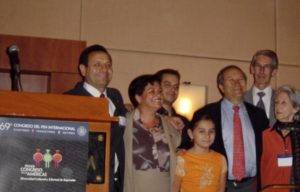
PEN International 69th Congress 2003. L to R: PEN main case General José Francisco Gallardo and family; Homero Aridjis, PEN International President; Terry Carlbom, PEN International Secretary; Nadine Gordimer, PEN International Vice President. (photo courtesy of Sara Whyatt)
The 2003 International PEN Congress in Mexico City was celebrated as the First Congress of the Americas. Hosted by Mexican PEN, it was also supported by Canadian PEN, Quebecois PEN, American PEN, and the Latin American PEN Foundation. It was the final Congress under the presidency of Mexican poet and novelist Homero Aridjis. Organized around the theme of “Cultural Diversity and Freedom of Expression,” the 69th Congress welcomed delegates from 72 PEN Centers from every continent except Antarctica. At the Assembly six new centers were admitted—Afghanistan, Morocco, Paraguay, Spain, Trieste, and Zambia; three dormant centers—Chilean, Kenyan and German-speaking Writers Abroad—were reinstated as active.
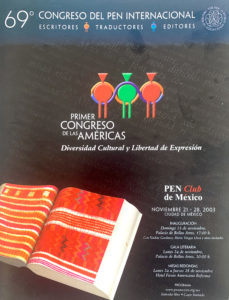
PEN International First Congress of the Americas 2003 in Mexico City. Theme: Cultural Diversity and Freedom of Expression
The admission of new centers was especially celebratory because of the number and the variety, leading with Afghanistan. Two delegates—a man and a woman—had traveled from Kabul in spite of the conflict in the country. Eugene Schoulgin, chair of the Writers in Prison Committee and member of Norwegian PEN, had visited Afghanistan twice that year along with Norwegian PEN member Elisabeth Eide. Eugene told the Assembly how impressed they were by the courage and vitality of the Afghan writers. “For them, after so many years of war, it was extremely important to open a window to the world through which they could look outwards and through which others could be introduced to their rich literature and culture and become friends in this tormented part of the world.”
Twenty Afghan writers had rented space in Kabul for a writers house, signed the PEN Charter and sent it to London with their membership application. (Less than a decade later there were 1000 members of Afghan PEN.) The Afghan delegate Partaw Naderi told the Assembly in order to reflect the major languages and communities in Afghanistan, the center planned to have a Pashtun language section, a Persian language section, and a section for Uzbek, Turkmen and other local people. In the last three decades writers had become refugees, mainly in Pakistan and Iran and some in the West, he said. Now one of the cultural centers in Kabul was ready to publish work by some of them though “freedom of expression was very, very limited” with frequent attacks and killings of writers and journalists. He had made the long trip to attend PEN’s Congress in order “to be among kind people,” and he profoundly wished for democracy and freedom of speech in Afghanistan.
Alexander Tkachenko of Russian PEN and a PEN International Board member observed that the Soviet Union had brought great trouble for 20 years to the Afghan people, their culture and literature, and he apologized for this and gave support to the new PEN center.
In response, Safia Siddiqi, the second Afghan delegate, said writers were not enemies; it was the governments. “Pens did not kill people, pens constructed things and helped people to join together in friendship,” she said, urging “their brother from Russia,” not to feel that writers were ever the enemy of each other. Thanking all who had made this trip possible, she noted it was also important that women participate and overcome restrictions and cross boundaries to come to places like Mexico.
Every new PEN center has its own story and mandate. I expand here on only one more at the Mexican Congress because that center’s raison d’etre also represented a change that was about to be voted on regarding PEN’s Charter.
The Trieste Center’s organizing principle was not nationality—it was located in Northern Italy—nor a single language—the writers spoke and wrote in Italian and many other languages—but culture as an organizing principle. The majority of PEN Centers were formed around geographic and national locations such as the new Morocco, Paraguay and Zambian centers. Countries can have as many as five centers if the nation is large like Russia, China and the U.S. or if there are multiple languages originating within its borders such as Spain which now had three centers—Catalan, Galician and Spanish centers or like Switzerland which had four centers—Swiss Romand, Swiss German, Swiss Italian-Reto-Romanish, and Esperanto. A few centers were formed in exile when the host country was not free enough for a PEN Center like Vietnamese Writers Abroad or Cuban Writers in Exile centers.
The Trieste Center was unusual. Endorsing the new center, Giorgio Silfer of Esperanto PEN observed that PEN centers did not represent nations; they represented literature, and literature did not need a nation to give it identity—as was the case with Yiddish, Roma and Esperanto. Literature established its own territory, and when a language was dead, its literature was simply and only an expression of connection with memory, he said. Trieste was a unique place, a cosmopolitan city: its writers in Italian were the expression of a culture that was not exactly Italian culture, but which incorporated expressions from other linguistic traditions.
Tone Persak of Slovene PEN added that Trieste had been “the town in the open space, on the open wind.” There had been extraordinary writers in different languages there: Italian, Slovene, English, Spanish, Croatian, Serbian, Yiddish, German, Friulian and so on. James Joyce, Rainer Maria Rilke, Italo Svevo, Juan Octavio Prenz. It had been a town of many conflicts but also the town of the cohabitation of different cultures.
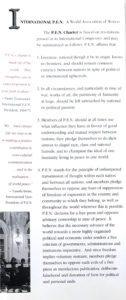
PEN International’s Charter before amendments in earlier brochure
Serbian delegate Vida Ognjenović and Croatian delegate and PEN International Board member Sibila Petlevski highlighted the multilingualism in Trieste and observed that the current situation after many, many Balkan wars had created an environment in Trieste where a PEN Center whose members came from different nations could cooperate with the Italian Center and all the other Centers in the region and give rise to new ideas. The Trieste Center was accepted.
The following day an amendment to PEN’s Charter was approved, the first change to this central document since the Charter’s text was agreed at the 1948 Copenhagen Congress. Literature’s origin beyond nationality informed the amendment which had been presented at the 2002 Macedonian Congress and vetted over the past year. The revision was a simple deletion of words. The Charter’s first item would now read: “Literature [deleted “national though it be in origin”] knows no frontiers and must remain common currency among people in spite of political or international upheavals.”
At the Mexico Congress another amendment was proposed and discussed for the fourth item in the Charter and would have a year for further consultation. The vote would come at the 2004 Congress. Both amendments involved a fine-tuning of words, reflected in the many pages of minutes, and an attention and passion for language and the translation of language which only a gathering of writers would have patience for.
These amendments and the changes proposed for the Regulations that evolved in the strategic planning process were shepherded by the International Secretary Terry Carlbom and especially by the Administrative Director Jane Spender whose patience and humor and intelligence kept everyone on track. The laborious task of taking more than 130 delegates through 30 Articles, often with subsets, fell to PEN International Board Member Eric Lax whose Sisyphean patience and care led the Assembly item by item. Ultimately all the recommended changes to the governance and structure of International PEN were approved.
The highlights involved the role and authority of the International PEN Foundation which focused on gathering resources for PEN and whose trustees had a voice on the Board but were also governed by the Board; the roles and authority of the International Secretary, the President and Board. The International President was to be a “distinguished writer of international literary reputation,” and the International Secretary was to have “actively participated in the affairs of International PEN” and was given a vote on the Board. These relationships were a moving target and would remain so over the years to come. In 2003 the President was given the discretion to lead and chair the Board and the Assembly but not the obligation so the role would depend on who occupied the office. A more formal Search Committee was established to seek out candidates for the positions of President, International Secretary and Board and to be elected by the Assembly on nomination by the Board. Chairs of both standing and special committees could attend regular board meetings but had no vote.
Deputy Chair of the Board Judith Rodriguez (Melbourne PEN) reported to the Assembly that the first Aim of the Strategic Plan, “Building the community of writers” included the item “expand PEN’s presence around the world and, in doing so, develop its humanitarian and cultural mission.” PEN was now pursuing a policy of cooperation with other organizations, initiated by the International Secretary’s signing of a cooperation agreement between International PEN and the European-Pacific Congress Alliance. The full Strategic Planning document would continue through a consultative process with the centers and be on the agenda for approval at the 2004 Congress in Tromso, Norway.
Parsing through, revising, getting approval of strategic plans and regulations for an organization as complex and diverse as PEN was a tedious but necessary task and reminded me of the book title “The Anarchists’ Convention.” Though rules and regulations and strategic plans would change in the years ahead, the Mexico Congress document was a base from which PEN grew and shape-shifted. Those who sat in the large Fiesta Americana ballroom can perhaps still hear Eric’s patient voice: “And now turn to Article 23…Comments…There being no further discussion, Article 23 is approved. Now turn to Article 24…”
Next Installment: PEN Journey 29: Mexico City and the Road Ahead—Part II, Substance
PEN Journey 27: San Miguel de Allende and Other Destinations—PEN’s Work Between Congresses
PEN International celebrates its Centenary in 2021. I’ve been active in PEN for more than 30 years in various positions and now as an International Vice President Emeritus. With memories stirring and file drawers of documents and correspondence bulging, I am a bit of a walking archive and have been asked by PEN International to write down memories. I hope this personal PEN journey will be of interest.
Over the years I’ve used various metaphors to describe PEN International—a giant wheel with 140+ spokes that reach out into the corners of the globe. A vast orchestra with the string, woodwind, brass and percussion sections scattered across the map, directed by local conductors and the Secretariat in London.
PEN’s core is an idea, codified in its Charter, acted upon by writers around the world organized into PEN centers. These writers and centers gather intensity as they work together.
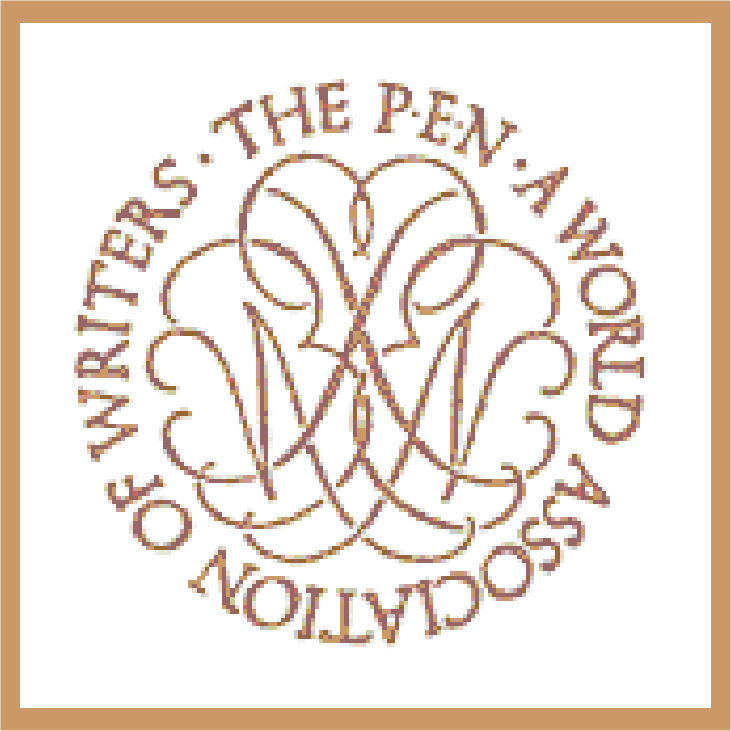
PEN International logo in 2002
Writers in a country or region or language are empowered to work as a center of PEN by the whole body of centers—the Assembly of Delegates—which vote on a center’s membership at PEN’s annual Congresses. During the months in between, PEN centers act both individually and collectively—celebrating and presenting literature in the many cultures and languages, mobilizing on issues of freedom of expression, acting to preserve and celebrate languages and translation, in particular minority languages, discussing and debating issues of peace, addressing the situation of women writers, and assisting and protecting writers who find themselves in exile. All of this activity between the annual Congresses occurs in the PEN centers and in the work of PEN International’s standing committees and at regional conferences which convene during the year.
I take a moment here to set out this template because in the PEN Journeys I’ve been focusing in large part on PEN’s annual Congresses. Yet the heart and soul of the organization resides in its centers and the individual members, most of whom never attend a PEN International Congress.
Some centers host the meetings of PEN’s standing committees. Slovene PEN has long hosted the annual Peace Committee meeting in Bled, Slovenia (PEN Journey 14). Until recently Macedonian and Catalan PEN have alternated hosting the Translation and Linguistic Rights Committee’s annual meetings either in Ohrid or Barcelona. The Women’s Committee set a new paradigm when it formed in 1991 by rotating its chair to different regions of the world and hosting its meetings there though recently because of costs, the Women’s Committee has held its meetings along with other committees, usually with the Peace Committee in Bled. As I’ve written in earlier posts (Journey 17 and 23) the Writers in Prison Committee began holding a biennial meeting in 1996, hosted by different PEN Centers. In recent years to share costs, the Writers in Prison Committee (WIPC) has teamed up with ICORN (International Cities of Refuge Network) to hold its biennial meeting in different countries. The recent 2018 WIPC meeting was held aboard a docked cruise ship in the Rotterdam Harbor.
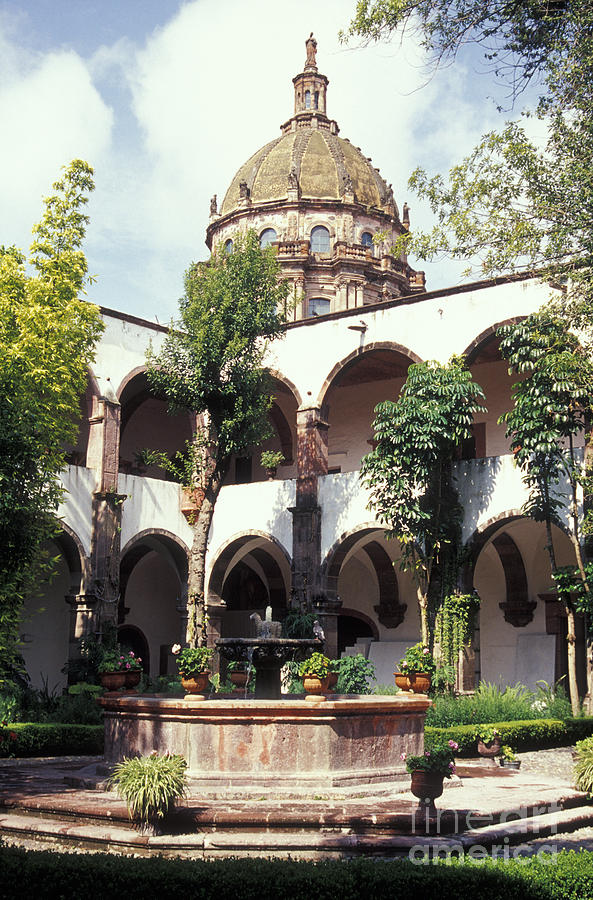
Bellas Artes Center, San Miguel de Allende, site of PEN WIPC conference, November 2002
In November 2002 the fourth WIPC meeting gathered in San Miguel de Allende, hosted by the PEN Center there in the charming old colonial town 170 miles from Mexico City where the 2003 PEN Congress would convene the following year. Forty-three PEN members from 25 centers from six continents gathered at the Bellas Artes center for a three-day conference followed by a meeting of the PEN Americas Regional Conference with the Latin American PEN Centers.
At the Bellas Artes center, originally the cloister of a convent, and in the Teatro del Artes PEN members met in workshops to review sources and methods as related to the threats of terrorism and anti-terror laws to freedom of expression, to review campaign techniques, PEN’s work at the United Nations, missions, regional networks, exile and asylum issues, borderline cases and finally strategies for the future. PEN’s WIPC set out to research a report in consultation with other organizations on the effect of anti-terrorism measures worldwide on freedom of expression, a report that would be presented at the 2003 PEN Congress.
In San Miguel PEN’s WIPC launched a report and a campaign “Freedom of Expression and Impunity Campaign” with an epigraph from Helen Mack, sister of anthropologist Myrna Mack, who was murdered in 1990 on orders carried out by the Guatemalan military. Helen Mack wrote:
Through my experience as co-plaintiff in the on-going trial to resolve the murder of my sister, Myrna Mack, I have seen impunity up close, along every step of this tortuous path in search of justice. I have felt it when essential information has been denied that would determine individual criminal responsibility; when judges and witnesses have been threatened; when the lawyers for the accused military officials use the same constitutional guarantees of due process in order to obstruct judicial procedures; and when my family, my lawyers, my colleagues and I have been threatened or been victims of campaigns to discredit us. In every action that is oriented toward generating impunity, one can clearly see the hand of agents of the State who use the same judicial and security institutions to pervert, once again, the goal of reparation through judicial means as well as the right to the truth and to justice.
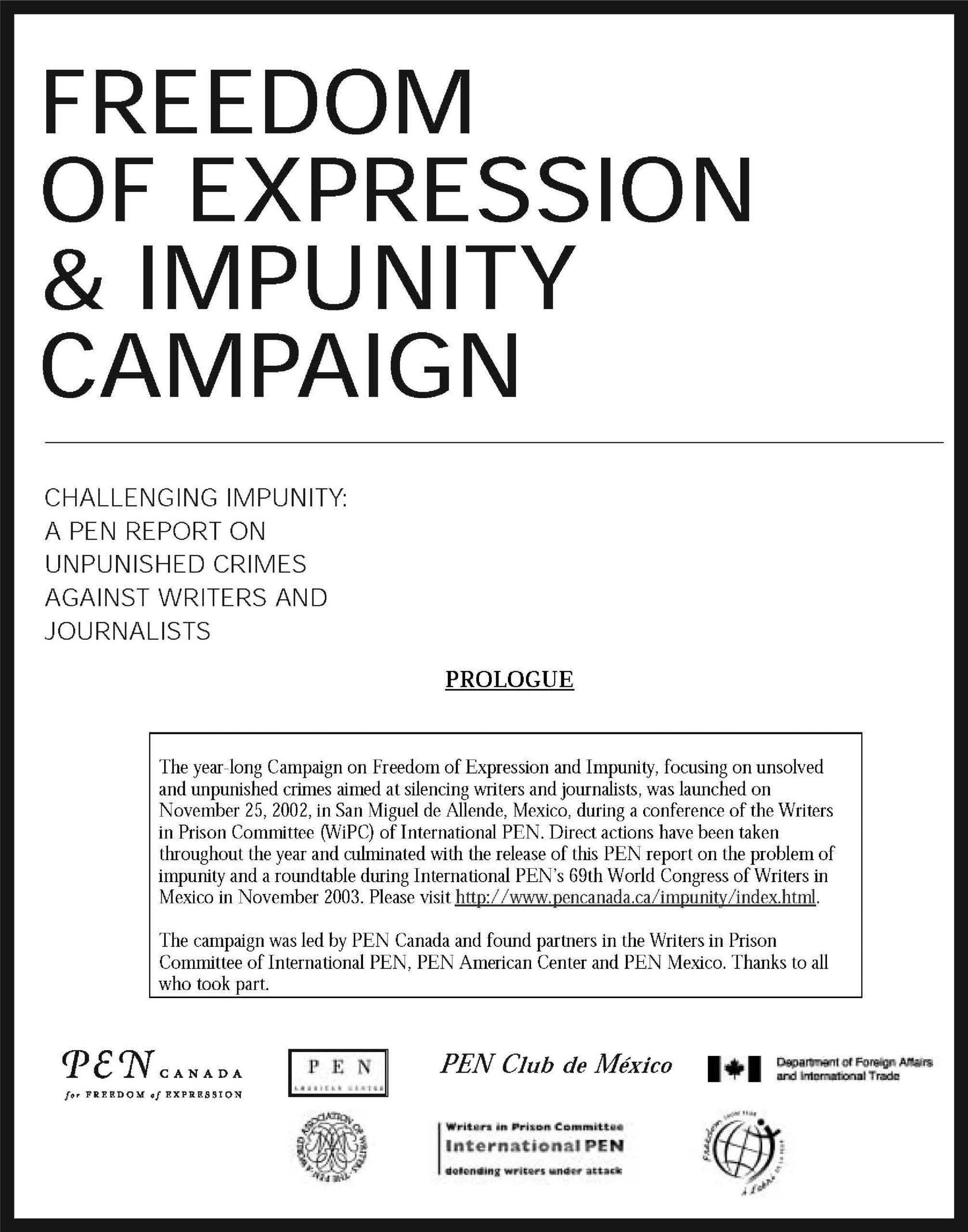
PEN International Impunity Report, launched at 2002 WIPC Conference, San Miguel de Allende
The Impunity report focused on Colombia, Iran, Mexico, Philippines, and Russia but PEN’s ongoing campaign targeted the issue wherever it occurred in the world.
Addressing the 2002 WIPC Conference and the Latin American Network was Brigadier General José Gallardo Rodriguez. At the Macedonian Congress earlier in the year PEN International President Homero Aridjis had reported on General Gallardo’s release. “Last February, I was invited to testify on behalf of PEN on General José Francisco Gallardo’s case, as one of three witnesses scheduled to appear before the Inter-American Court on Human Rights at a hearing in Costa Rica,” Homero said. “A few days before the hearing at which the Mexican Government was ordered to appear, he [Gallardo] was unexpectedly pardoned and released from jail, nine years after his arrest and imprisonment following the publication in the magazine Forum of an excerpt of his masters’ thesis about the need for a military ombudsman in Mexico. General Gallardo’s release was an important victory for freedom of speech and a significant advance of justice in Mexico. PEN Centers worldwide who defended Gallardo’s cause for eight years now celebrate the liberation of a Mexican Dreyfus.”
General Gallardo thanked International PEN for its invaluable support for having campaigned on his behalf, and he assured that he would continue to press for the creation of a military ombudsman.
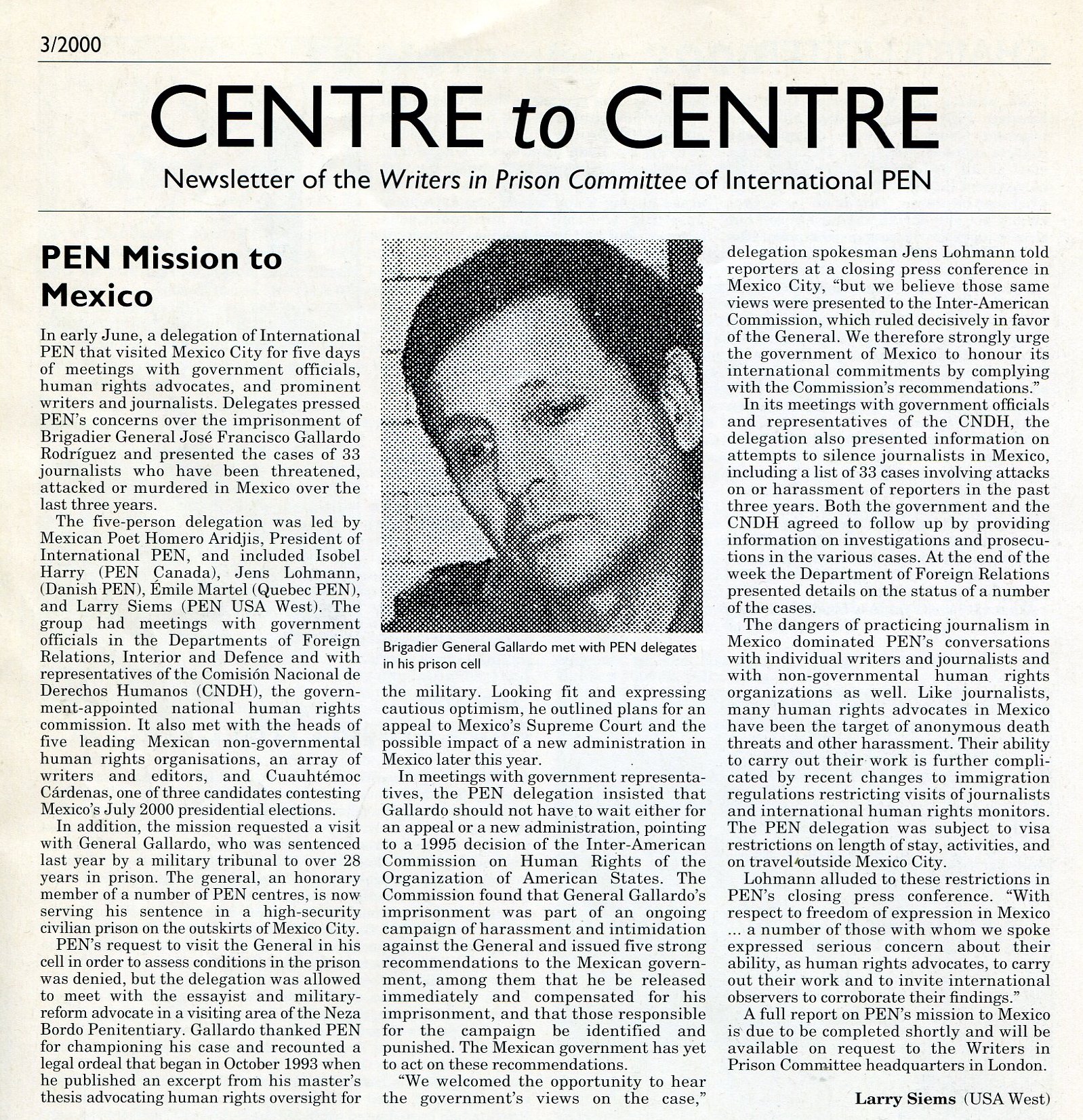
PEN WIPC newsletter 2000 on case of General José Gallardo Rodriguez
The Special Rapporteur on Freedom of Expression for the Organization of American States also participated on a panel on Corruption and the Writer, focusing on the problem of impunity, its link to corruption, its effect on free speech and the role of the writer in combating these problems.
Noting the increasing workload of the WIPC and the fact that the staff and budget had not grown at the same rate, several members suggested a Steering Committee of five individuals/centers be formed to assist the WIPC headquarters and work directly with committee chair Eugene Schoulgin and the WiPC staff led by Sara Whyatt. This group would formulate a strategy for the next three years, help define priorities and address the resources needed to achieve the goals. The proposal was accepted, and Isobel Harry (Canadian PEN), Archana Singh Karki (Nepal PEN), Jens Lohmann (Danish PEN), Lucy Popescu (English PEN) and Larry Siems (American PEN) formed the Planning Group. Their goal was to produce with the staff a plan that would be vetted by all WiPC members and approved at the Mexico Congress.
At the same time PEN International as a whole was undergoing a major strategic planning process. As the century turned, PEN International was in the midst of restructuring itself both to develop a more democratic governance system and also to address its rapid growth and funding challenges. In this process American PEN was an important actor, along with the Scandinavian and Japanese centers. American PEN, located in New York, was the largest of PEN’s centers and contributed more dues than any other center, but it had not hosted an International Congress since 1986 and did not host any of the international conferences or committee meetings. It had launched a World Voices Festival after 9/11 to bring international writers to the U.S. but this was an American PEN, not an International PEN, activity. However, with the assistance of two former American PEN presidents—Edmund (Mike) Keeley and Michael Scammell and American PEN Executive Director Michael Roberts and former PEN USA West President and International PEN Board member Eric Lax, the American contingent stepped up to raise funds from American foundations, including the Mellon Foundation and the Rockefeller Foundation to assist International PEN in a major strategic planning initiative. This consisted of several preliminary conferences in London and a final gathering at the Rockefeller estate in Bellagio, Italy.
The Americans, particularly Mike Roberts, PEN America’s Executive Director, understood that American PEN was only as strong as the whole body of PEN which at the moment had a very small hub or Secretariat for a very large wheel of 140 spokes. The core needed strengthening both structurally and financially. International Secretary Terry Carlbom, International PEN President Homero Aridjis, Deputy Vice Chair of the Board Carles Torner and the whole Board of PEN International, along with members of the board of the PEN International Foundation, Standing Committee Chairs, and several Vice Presidents agreed and committed to the strategic planning process.
During the last decades PEN had depended on funds from its centers and from UNESCO and from SIDA, the Swedish Development Association and a few other funders, but the world was changing and with it the sources of funding. U.N. organizations like UNESCO were under siege. Government funding for European and East European cultural organizations was evaporating; the same was true for other PEN centers. The challenge for PEN was structural and financial. No one knew what the 21st century would bring, but most everyone understood it would not be the same.
Next Installment: PEN Journey 28: Bellagio: Looking Forward—PEN for the 21st Century
PEN Journey 24: Moscow—Face Off/Face Down: Blinis and Bombs—Welcome to the 21st Century
PEN International celebrates its Centenary in 2021. I’ve been active in PEN for more than 30 years in various positions and now as an International Vice President Emeritus. With memories stirring and file drawers of documents and correspondence bulging, I am a bit of a walking archive and have been asked by PEN International to write down memories. I hope this personal PEN journey will be of interest.
“Contrary to our tradition, this year’s PEN Congress is being held in a country in which a massive, genocidal military and paramilitary operation is under way. Besides mass murder, the crimes perpetrated against the civil population of Chechnya include deportation, rape, torture, destruction and theft of personal property as well as the systematic looting and destruction of the material bases of Chechnyan culture and civilization. At the same time, freedom of information has been severely curtailed, and the official propaganda plays on xenophobic and even racist ethnic stereotypes…” So began a Declaration from the 67th World Congress of International PEN voted by the Assembly of Delegates in May, 2000.
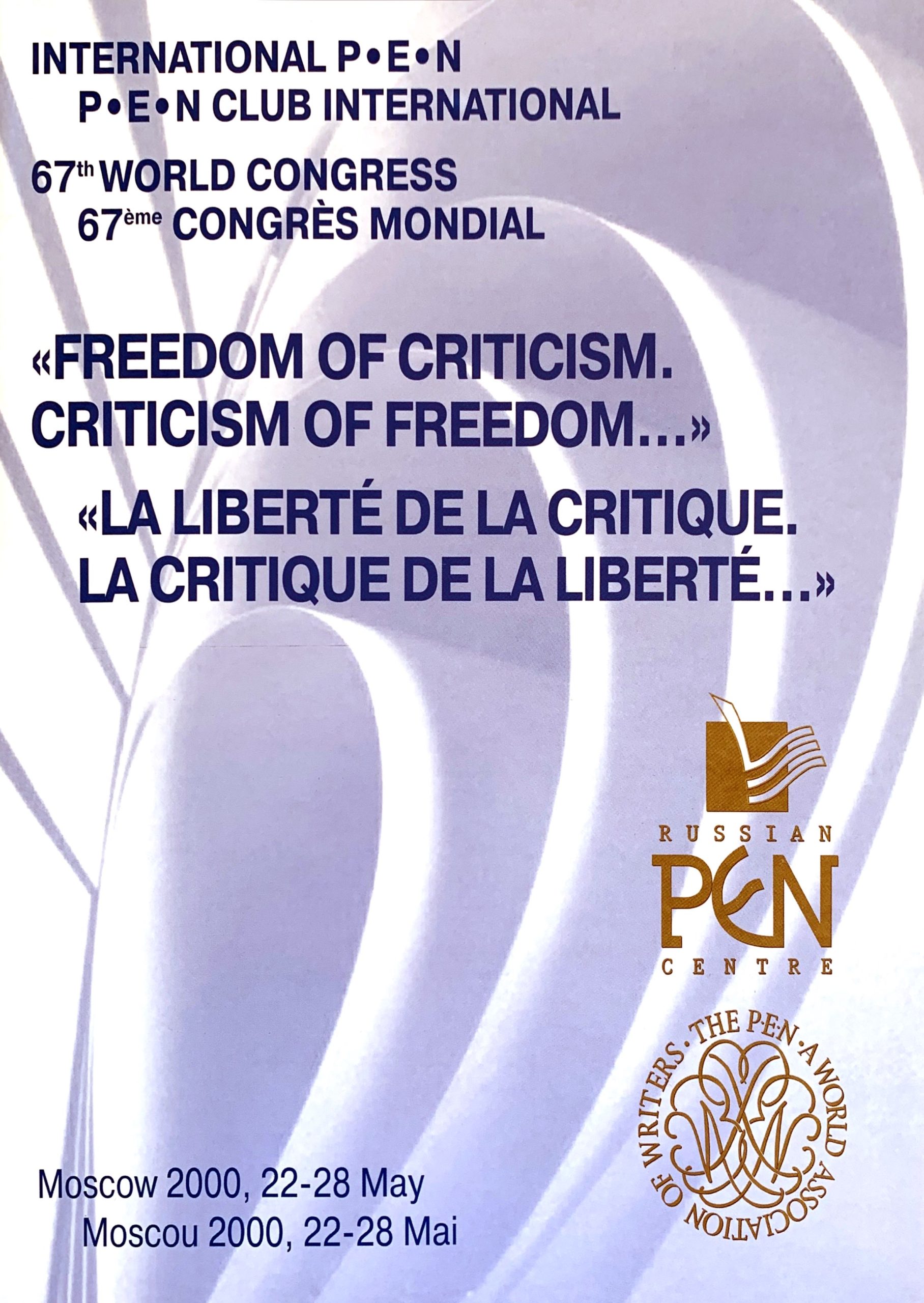
Program for PEN International 67th World Congress, Moscow
The decision to hold the International PEN Congress in Moscow was a controversial one, resulting in some members refusing to attend because of Russia’s prosecution of the war in Chechnya and the concern that holding a Congress in Moscow would give the government an appearance of approval. However, PEN’s Secretariat with the new Executive Committee concluded that the long-planned millennial Congress also presented the opportunity for International PEN to show solidarity with Russian PEN which had been outspoken both on the war and on behalf of Russian journalists and writers under pressure.
“The writers of Russia, united under the auspices of the Russian Centre of the International PEN Club, are concerned about the escalation of the war in Chechnya which is becoming a threat to not only peaceful residents of Grozny-city but also to the national security of Russia. The ultimatum announced to women, children and old people of the Chechen capital makes them hostages of both terrorists and federal forces. It is hard to believe that in this situation the Russian authorities are going to use the same methods as terrorists. We are very aware how hard it is to cut the tight Chechen knot, but in any case innocent people do not have to become victims of the decisions taken…” Russian PEN sent this appeal earlier to the acting President of the Russian Federation, Vladimir Putin.
Russian PEN members, including President Andrei Bitov, had signed the appeal. Russian PEN’s General Secretary Alexander (Sascha) Tkachenko noted at the Congress that it was essential to call on all those involved—Russian and Chechen—to cease their brutalities. Sascha himself had regularly stood up to the Russian government. He championed the cases of imprisoned writers Alexandr Nikitin and Grigory Pasko, both of whom had recently been freed after trials. Pasko, who was a journalist and former Russian Naval officer, had been arrested and accused of espionage for his publication of environmental problems in the Sea of Japan. Nikitin, a Naval officer, had been charged with stealing state secrets by contributing to a report that revealed the sinking of Russian nuclear submarines and the dangers these decaying submarines posed to the environment.
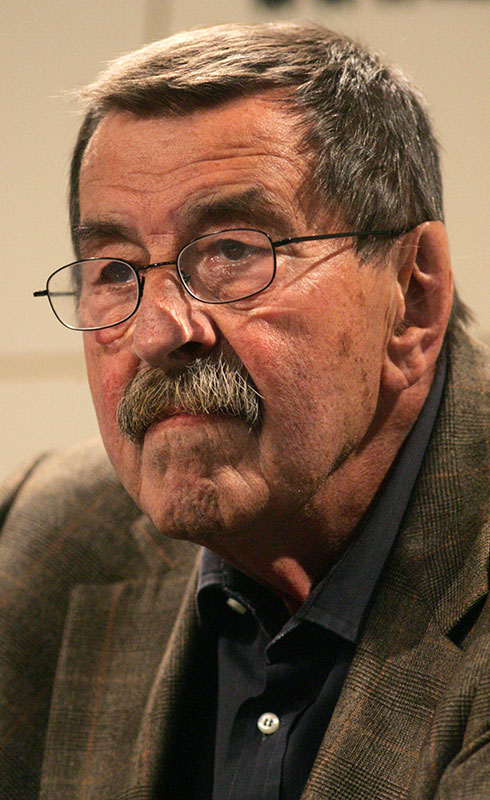
German novelist Günter Grass talk opened PEN’s 67th Congress
The freedom and the openings which many embraced after the break-up of the Soviet Union in the early 1990’s were beginning to close down and restrictions tighten. At the Moscow Congress Pasko expressed his gratitude for everything PEN had done to obtain his freedom. He urged the Assembly to focus on environmental problems. But he warned that the structure of the current Russian government had grown out of the KGB, and he feared nothing good would come for free speech or the environment.
In the opening address of the Congress German novelist Günter Grass, who won the Nobel Prize for Literature the previous year, recounted the many times in the past century that writers had called attention to the abuses and genocides which governments had tried to hide. “At least literature does achieve this—it does not turn a blind eye; it does not forget; it does break the silence,” Grass concluded.
The Congress theme “Freedom of Criticism. Criticism of Freedom…”seemed a particularly UNESCO title, with a focus on how freedom is exercised, noting that freedom unrestrained by morality can lead to a license for corruption, brigandage, state terrorism, censorship and the wanton murder of those who dare to speak out. “That freedom is a double-edged sword is a fact long appreciated in free societies. It is what prompted Voltaire to place a limitation upon it, when it interfered with the freedom of another,” one Congress description noted.
Thus framed, the panels and the work of PEN’s committees proceeded. Many wondered how able PEN members would be to criticize openly as we met both formally and in cafes sharing conversation and meals of blinis and caviar. There was no incident nor interference that I recall at the Moscow Congress nor at the subsequent programs in St. Petersburg, but we were all aware that repercussions could follow after we left. Over time Putin’s government did close down the space for NGO’s with Russian PEN as one of the early targets. (Future blog post.)
The Moscow Congress itself proved an opportunity to celebrate Russian literature and other literature as well as to conduct the work of PEN’s committees which met in halls named after Tolstoy, Pushkin, and Chekov. Many writers from over 70 PEN centers were visiting Moscow for the first time since the Soviet Union broke apart. Since my first trip in 1991 shortly after the coup attempt (PEN Journey 8), the city had changed. Western hotels, restaurants and stores had moved in; certain citizens had amassed wealth; others had lost jobs and security. It was a city of contrasts with children on the street begging, but begging by playing violins. A wealthy new group crowded the lobbies of western hotels and department stores.
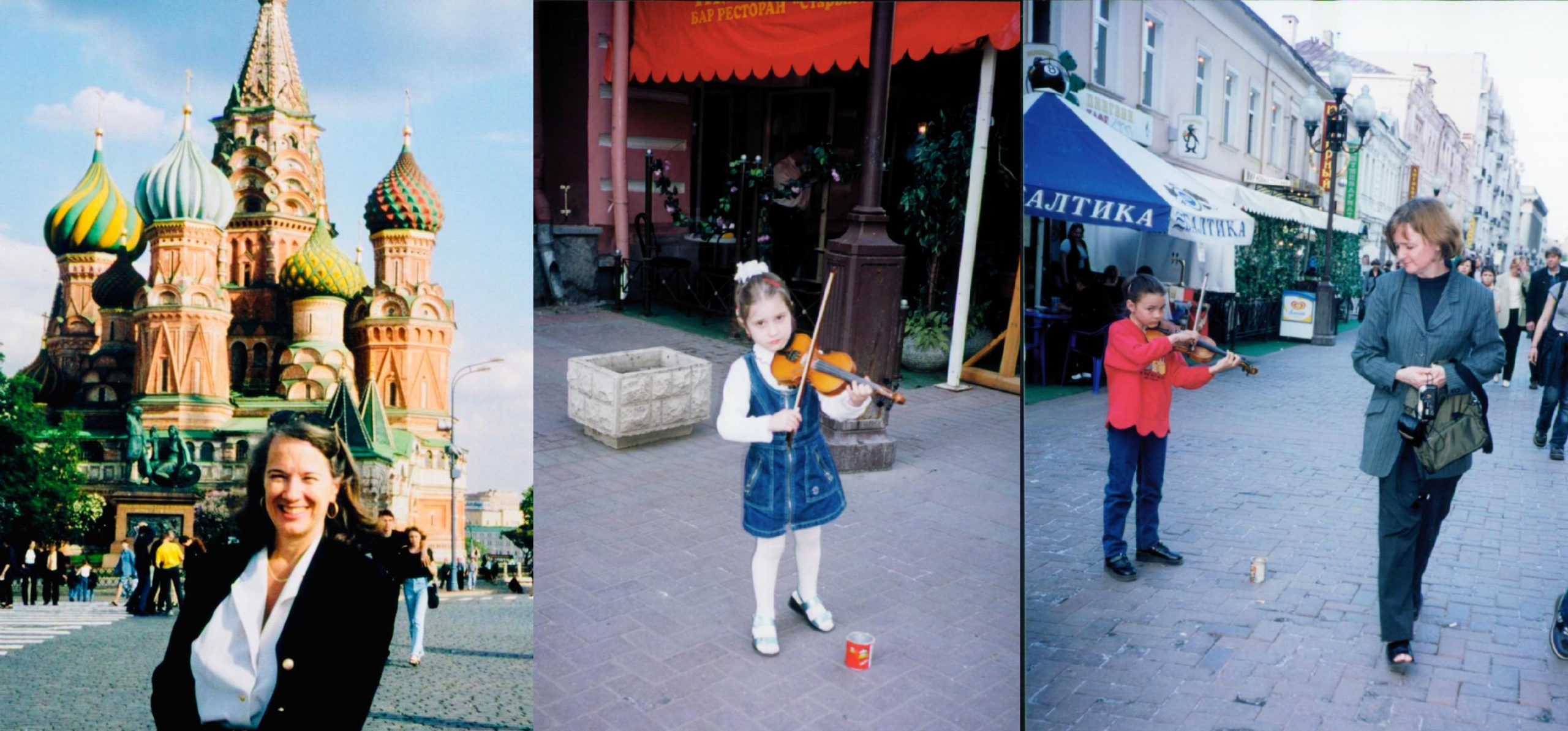
On the streets at PEN Congress in Moscow May, 2000: L: Joanne Leedom-Ackerman, PEN Vice President; R: Sara Whyatt, PEN Writers in Prison Committee Program Director
In a message to the Congress Andrei Bitov wrote:
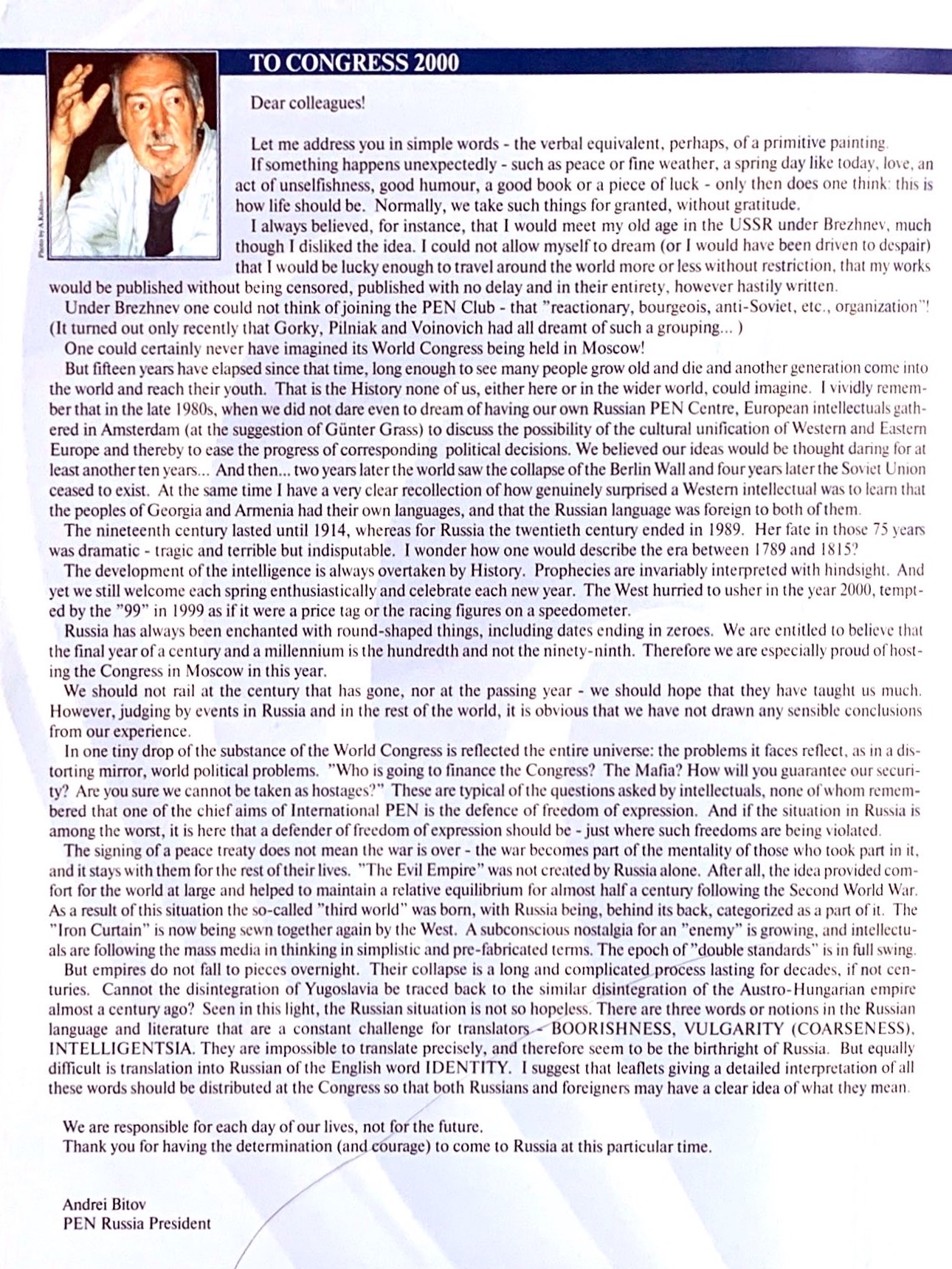
Full text of Russian PEN President Andrei Bitov’s message to PEN delegates
I always believed…that I would meet my old age in the USSR under Brezhnev, much though I disliked the idea. I could not allow myself to dream (or I would have been driven to despair) that I would be lucky enough to travel around the world more or less without restriction, that my works would be published without being censored, published with no delay and in their entirety, however hastily written.
Under Brezhnev one could not think of joining the PEN Club—that “reactionary bourgeois, anti-Soviet, etc., organization”! (It turned out only recently that Gorky, Pilniak and Voinovich had all dreamt of such a grouping…)
One could certainly never have imagined its World Congress being held in Moscow!
But fifteen years have elapsed since that time, long enough to see many people grow old and die and another generation come into the world and reach their youth. That is the History none of us, either here or in the wider world, could imagine…
We should not rail at the century that has gone, nor at the passing year—we should hope that they have taught us much. However, judging by events in Russia and in the rest of the world, it is obvious that we have not drawn any sensible conclusions from our experience…
In one tiny drop of the substance of the World Congress is reflected the entire universe, the problems it faces reflect, as in a distorting mirror, world political problems…
We are responsible for each day of our lives, not for the future.
Thank you for having the determination (and courage) to come to Russia at this particular time.
PEN’s business at the Assembly of Delegates included the International Secretary Terry Carlbom’s report on PEN’s relationship with UNESCO as the only global organization representing literature associated with UNESCO and a preliminary notice about a multi-year strategic plan under development. Business also included the election of the International President. Homero Aridjis was standing for a second term, and former International Secretary Alexander Blokh of Russian origin had returned to this PEN Congress for the first time since he’d stepped down as International Secretary in 1998, (PEN Journey 20) and he was also running for President. I was asked to chair the Assembly for the election, including during a stir that arose when Alex wasn’t present to speak for his candidature. He’d left the meeting early for an appointment, mistakenly thinking he would speak in the afternoon. However, there was no afternoon session, and controversy arose over whether the election should be postponed so he could speak. I ruled that he would be the first item on the morning agenda and then the election would proceed as scheduled. Homero Aridjis won a second term; Alexander Blokh continued to serve PEN for many years as a Vice President and President of French PEN.
Also at the Congress Martha Cerda (Guadalajara Center) succeeded Lucina Kathmann as Chair of the Women Writers’ Committee; Veno Taufer (Slovene PEN) succeeded Boris Novak, who’d opposed holding the Congress in Moscow and had stepped down as chair of the Writers for Peace Committee, and Eugene Schoulgin (Swedish PEN) was confirmed as the new Writers in Prison Committee Chair.
In his farewell comments as WiPC chair Moris Farhi quoted Günter Grass’s address that literature always breaks the silence. Moris added that by breaking the silence, by telling the truth and exposing wrong-doing, literature also defied fear and embraced courage. The members of International PEN had witnessed this defiance of fear and the manifestation of courage time and again. Moris noted among those with courage were Grigory Pasko, Alexander Tkachenko and our colleague Boris Novak.
The Moscow Congress saw the return of delegates from Chinese PEN after a decade-long absence post Tiananmen Square. Two resolutions on China were presented, one calling for the release of dissident writers imprisoned in China and another protesting the long prison terms for writers in Tibet. The Chinese delegate objected to both resolutions, arguing first that Tibet shouldn’t be singled out as though it were not part of China. He also said that the Chinese people and Chinese writers cared for human rights after centuries of feudal society, but the West emphasized individual rights and values while the Chinese valued collective human rights and obligations to the family and society. The Chinese believed that human rights in a given country were related to the social system, the level of economic development and historical and cultural traditions of that country, and they encompassed the right to development and subsistence. A country of more than 1.2 billion people had to find food and clothing. It was impossible for one pattern to solve all existing problems. The Cold War had ended, but its influence remained with those who believed their values, their concept of human rights, their position were the only correct ones in the world. Dialogue was the only way to resolve the differences of view, a dialogue based on equality and mutual respect.
Hands shot up seeking to respond. At least 25 delegates at the Assembly spoke, welcoming the return of the Chinese delegates to the PEN Congress, but most taking exception to the argument of the relativity of human rights in PEN’s work. The first to speak was Eric Lax of PEN Center USA West who said he appreciated the speaker’s comments but wanted to add that the PEN Charter, to which all members subscribed, was very clear that freedom to write was a basic tenant of the organization and that information should pass unimpeded without restriction. Some questioned the way the resolution was written. Alexander Tkachenko of Russian PEN said he felt PEN should be understanding of people living under a regime about which the rest of PEN knew little. It was up to the Assembly to decide whether to support the resolution; they needn’t accept the Chinese delegate’s opinion, but they should respect it. He didn’t want the Chinese to be missing from PEN for another ten years. PEN should be tolerant of those for whom it was extremely dangerous to discuss such questions. The Assembly applauded. A small amendment was made to the resolutions, both of which passed with large majorities, though not unanimously.
The following year the Independent Chinese PEN Center (ICPC) came into being, a center of independent writers and democracy activists inside and outside of China. One of the founding members and the second president of ICPC (2003-2007) was writer Liu Xiaobo, on whose behalf PEN worked twice when he was imprisoned after Tiananmen Square and again when he was arrested in 2009. Liu Xiaobo was the first Chinese citizen to win the Nobel Prize for Peace in 2010, but he was incarcerated in a Chinese jail, and he died in custody in 2017.
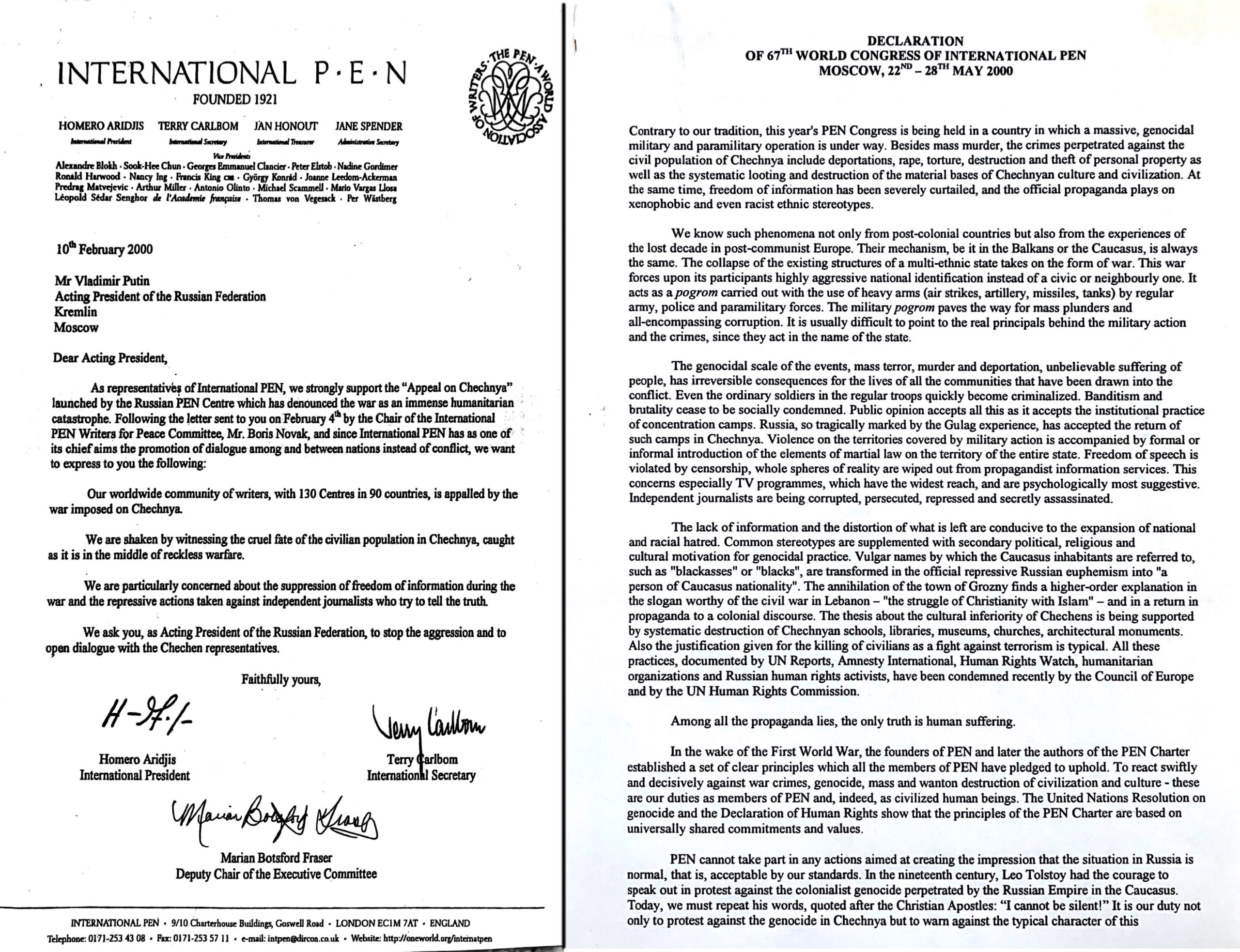
Next Installment: PEN Journey 25: War and more War: Retreat to London
PEN Journey 23: Nepal—WIPC Crossing the Bridge Between People
PEN International celebrates its Centenary in 2021. I’ve been active in PEN for more than 30 years in various positions and now as an International Vice President Emeritus. With memories stirring and file drawers of documents and correspondence bulging, I am a bit of a walking archive and have been asked by PEN International to write down memories. I hope this personal PEN journey will be of interest.
As I write these PEN Journeys, memory differs with each one. I sit and think, pulling up whatever memories I have. Some are visual; some are of activities, some of the twists and turns in PEN itself; many are of friends, a few of incidents; others come from concurrent parts of my life such as moving to London with my family and connecting to work at International PEN headquarters (PEN Journey 5), or scaling the Berlin Wall just after Germany reunited (PEN Journey 4), or visiting Russia shortly after the coup attempt (PEN Journey 8).
I have paper documentation for most of PEN’s events, not because I was an archivist in the making but more of a packrat who was too busy to sort through papers after a congress or conference and so set the files in a drawer. I am not even accounting for all the emails and digital files that began to accumulate in the late 1990’s and 2000’s. In my recounting, I am only now entering that period when the internet and email were burgeoning. For some of the Journeys I have photographs, but my picture-taking was random in retrospect, probably reflecting my role at the time. The more work I had, the fewer pictures. There were no iPhones or Android phones during these earlier years so I had to have a camera at hand. In certain years I have no photographic record of PEN though some may yet turn up in the recesses of my basement. There are, however, always pictures in my head.
For the Writers in Prison Committee’s (WiPC) third biannual meeting in Katmandu, Nepal in the spring of 2000, I have lots of pictures. We were celebrating the 40th anniversary of International PEN’s Writers in Prison Committee. As ex-chair, I helped with the conference, but the burden of the meeting wasn’t mine so I was also out with camera in hand. In my head I still carry the landscape of Nepal—the hills outside Katmandu with the haze over mountains in the distance, the woman in a red sari walking up the hill carrying bundles of sticks, the gentle landscape and the harsh conditions.

Landscape in hills and fields outside Katmandu, Nepal at Writers in Prison Committee Conference, April 2000
I arrived a few days early to visit schools and women’s education projects relating to other work I did, some as a board member of Save the Children. By the time I joined the PEN Conference, I had already fallen in a soft love with the country and its people, the old—sometimes centuries old—and the new culture: Katmandu with its rickshaws and bustling streets and vibrant colors and the hills outside where farmers still farmed with oxen plowing the fields and children high in the hills crowded into village schools and women learning to read in makeshift community libraries. And there was the nation’s complicated governing system with a privileged royal family which only a year later would be massacred by one of its own and in the hills a Maoist insurgency developing which threatened the government and population for years to come. Nepal was as dramatic a place as the landscape it occupied.

At work and rest at WiPC Conference. L to R: Alexander (Sascha) Tkachenko (Russian PEN), Joanne Leedom-Ackerman (American PEN/PEN Int’l), Mitsakazu Shiboah (Japan PEN), Jens Lohman (Danish PEN), Cathy McCann (Asia researcher PEN Int’l), Larry Siems (American PEN), Eugene Schoulgin (Norweigan PEN), Lucina Kathman (San Miguel Allende PEN)
At PEN’s WiPC conference, 43 writers gathered from 25 countries representing every continent except Africa where the costs had limited attendance. Before the meeting WiPC chair Moris Farhi and I and the WiPC staff met to identify areas of work that needed review and possible restructuring. From a survey of the centers we developed discussion points which were circulated before the meeting. Since the fall of the communist states, PEN had seen a growth in membership, an increase in freedom of expression work by the centers, and an expanded use of email and the internet. The innovation in communications was having an impact on the way PEN did its work and challenged old methodologies such as letter-writing campaigns.
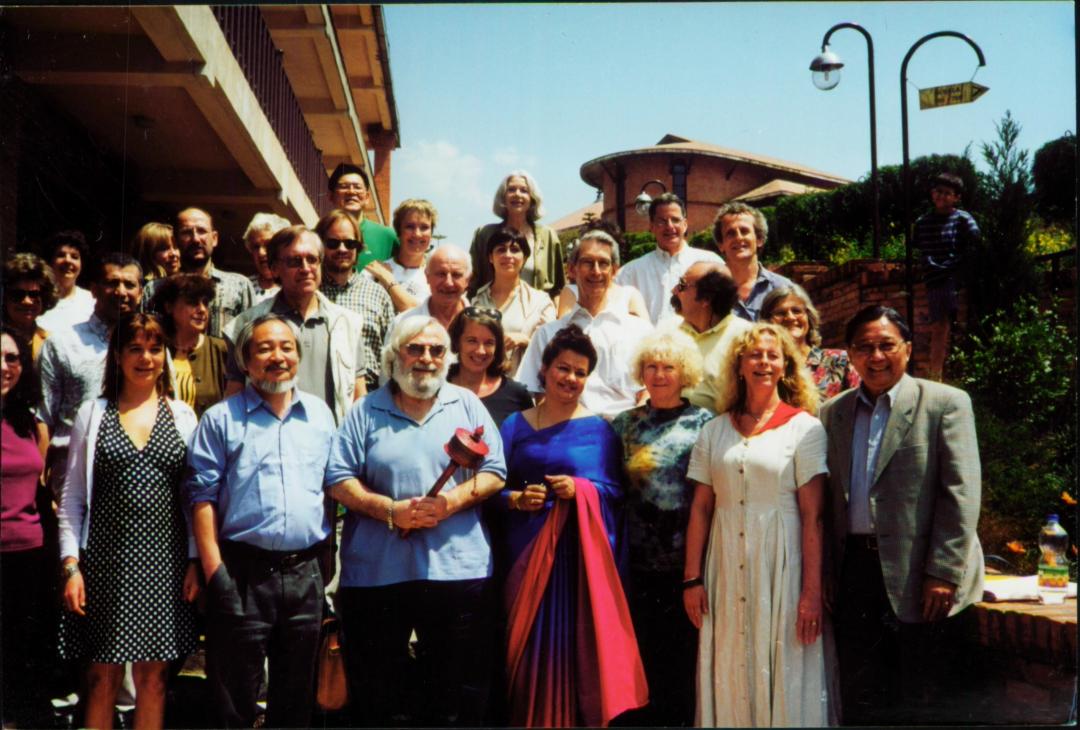
Delegates at PEN Writers in Prison Committee Conference, Nepal, 2000. In center WiPC Chair Moris Farhi holding local prayer wheel.
The agenda developed included workshops on the use of the internet, on PEN’s WiPC case list and newsletter, on PEN’s commitment to journalists in peril as compared to writers who had no other organization to protect them. We considered crisis situations and the changing nature of repression, including nongovernment and non-custodial forms of repression, WiPC relations with international organizations, the role of PEN’s Congress, the role of regional centers and networks, the value of PEN missions to other countries, and always, the discussion on how to fund the work and how to assure those finances included funds to bring delegates from every region to future meetings.
Looking back at the program, it appears exhaustive (or exhausting), though I don’t recall it as tedious or overwhelming. With each workshop, the group developed a summary of the situation and recommendations. For example, a recommendation was to post on PEN’s website, accessible to everyone, the information on the RAN special actions. The RAN (Rapid Action Network) itself was a relatively new tool which was sent out over the internet for immediate action on certain PEN cases. It was also agreed and recommended in another workshop that journalists should continue to be part of PEN’s campaigns and that PEN should collaborate more closely with journalists’ organizations.
Reading through the minutes and recommendations of the four-day meeting, I am impressed by the professionalism of the work of the WiPC staff, small as it was, just Sara Whyatt, Program Director and Cathy McCann, Asia researcher.
At the Nepal conference a new WiPC chair—Eugene Schoulgin from Swedish PEN was elected to take over from Moris Farhi after PEN’s Congress in Moscow the following month.
As well as workshops and discussions, we were entertained by local groups and also entertained ourselves with song and dance in the evening as we had at the first WiPC conference in Helsingør (PEN Journey 17).

After working days at WiPC Conference, music and dancing, including local Nepal PEN members and Sara Whyatt (WiPC Program Director) in orange skirt on left and on right Archana Singh Karki (Nepal PEN) in white; local musicians in middle.
On the last day UNESCO sponsored a panel The Culture of Peace: Censorship and the Writer which PEN Nepal President Greta Rana introduced, observing that censorship led to violence and that 47 journalists in South Asia were currently imprisoned for addressing free expression issues. Sara Whyatt in her introduction of the printed talks noted that free expression was inextricably entwined with the promotion of peace for without voices to challenge dictatorships and warmongers, peace would be an even rarer commodity than it was.
Because I don’t need copyright permission to reprint my talk, I take the liberty of sharing it below. Other panelists included Ratna Sarumpaet, an Indonesian script writer whose play about the plight of women laborers led to her imprisonment; Kunda Dixit, a Nepali journalist who spoke about the role of the free media in ensuring objectivity in times of pressure from political and corporate interests; Shahid Nadeem, a Pakistani playwright long exiled in England, who told of returning to Pakistan where critical voices were still seen as a threat; WiPC Chair Moris Farhi who noted that xenophobia and religious fanaticism were increasingly dangerous elements; Rajeev Rajbhandari, a Nepali internet expert, who argued it was not the content of the internet that was problematic but the uses of its new technology; Romesh Gumesekere, a Sri Lankan author and poet, who identified illiteracy as an encumbrance to the promotion of free expression; and myself whose talk below began with the poem of the renowned Turkish poet Nâzım Hikmet:
The prisoner Halil
closed his book.
He breathed on his glasses, wiped them clean,
gazed out at the orchards,
and said:
“I don’t know if you are like me,
Suleyman,
But coming down the Bosporus on the ferry, say
making the turn at Kandilli,
and suddenly seeing Istanbul there,
or one of those sparkling nights
of Kalamish Bay
filled with stars and the rustle of water,
or the boundless daylight
in the fields outside Topkapi
or a woman’s sweet face glimpsed on a streetcar,
or even the yellow geranium I grew in a tin can
in the Sivas prison—
I mean, whenever I meet
with natural beauty,
I know once again
human life today
must be changed . . .”
—Nâzım Hikmet, Human Landscapes
In 1938 Turkish poet Nâzım Hikmet (1902–63) was sent to prison, charged with “inciting the army to revolt,” convicted on the sole evidence that military cadets were reading his poems. He was sentenced to 28 years but was released 12 years later in 1950. His “novel” in verse, Human Landscapes from My Country, was written in prison, featuring Halil, a political prisoner, scholar, and poet who was going blind….
Today in Istanbul journalist Nadire Mater is charged with “insulting the army” for her book Mehmet’s Book, a collection of interviews with soldiers who have served in the conflict with the Kurds in the Southeast of Turkey. Nadire Mater and her publisher will be in court in early May to face charges, which could bring them at least six years in prison.
I’d like to read a brief passage from one of the interviews in Mehmet’s Book:
These friends coming from the West didn’t really know any Kurds, because they don’t know any they couldn’t really understand very well. What should be said about this? They are not familiar, and not being familiar, they act according to the government’s opinion…They’ve adapted to what they hear and read. I would explain to these friends that the other side is human, that the politics of the government is wrong.
We all of course adapt to what we hear and read. That is why it is so important that we have the opportunity to consider many points of view. The reality we carry in our heads and in our hearts shapes us as individuals and governs us as nations. Writers are the ones who produce what people read. The writer bears both the responsibility and the liability for his words and the realities they evoke. The writer can be a positive instrument for change as Hikmet saw the need, or as we have seen in the past decade in the Balkans, the writer can inflame animosities. The writer is not always the hero, but at his or her best, the writer can build bridges, reporting on and imagining not only himself, but those who are not him, illumining he humanity that connects us.
Peace between people relies on such bridges. The nature of a bridge is to span the space between points. The pilings of a bridge absorb the tension as one crosses over the space. However, censorship undermines, even destroys the pilings. The censor would allow only a limited view of reality, and by disallowing other views, the censor cuts away at the pilings necessary to build the bridge between him and the so-called enemy.
Censorship takes many forms. Whether it be brutal killings as in Iraq, death threats as in Peru and Colombia, long term prison sentences as in Burma and China or shorter terms as in Cuba or endless court cases as in Turkey where writers say the judicial process itself is punishment, the effect of censorship is to weaken or even tear down the bridge and to freeze up the imagination that envisions this bridge.
Fortunately, however, the imagination is a nimble and wily companion. It is also the natural enemy of the tyrant. While a man or woman can be censored, threatened, even put behind bars, his ability to think and imagine other worlds can defy and even eventually triumph over the most ruthless tyranny. I still remember reading and hearing the testimony of writers in prison in the Western Sahara in the early 1990’s when they were forced to live in subhuman conditions. They spoke about how they used their ration of soap to write poetry on their trousers, used coffee grounds to write on any scrap of paper they could find in the prison yard. They then memorized each other’s verses to stay alive and sane. The prison guards told them they might as well forget the outside world for they would die in prison. But they could imagine another world, and they lived in their imaginations, and those outside prison imagined them and worked on their behalf. Ultimately they were freed.
In the work PEN does for writers we have observed tragedies, but we have also witnessed the resiliency of writers and the power of ideas to find their way.
I have always found instructive the story of the Zimbabwean novelist Solomon M Mutswairo. Writing in the 1950’s Mutswairo knew the implication of his message and the sting of the British censor so he cast his story in the ancient kingdom of his people. The political content went unrecognized by the British, who in an expansive mood in 1956 published his novel Feso as the first novel in the Shona language. The Shona people, however, understood the story of protest against oppression. When the British finally realized what they had published, they came to arrest Mutswairo, who happened to be teaching in the U.S. at the time. He protested from afar. But how can you arrest me when you are the ones who published my book! Feso later became a rallying cry for independence.
Today with the move towards democracy around the world, fewer countries routinely throw writers in prison, but PEN still monitors cases of writers in over 80 countries, including Nepal. In many countries the struggle towards democracy has not yet yielded the full freedom of expression, including a free press, that is essential.
Freedom of expression is an engine and a safety valve in strong working democracies for that is how the population both expresses itself and gains information and different points of view in order to make decisions.
Historically democracies have not gone to war with each other. Since we are considering a “culture of peace” in this panel, we do well to pay attention to the freedom of expression on which strong democracies are built. With imagination one may envision the bridge to peace; the writer may articulate the vision but it is up to us all to walk across that bridge. Let us hope its pilings are secure.

Next Installment: PEN Journey 24: Moscow—Face Off /Face Down: Blinis and Bombs—Welcome to the 21st Century